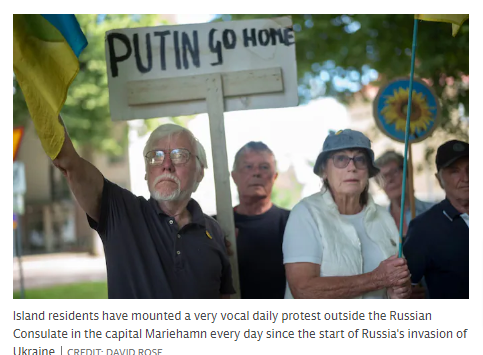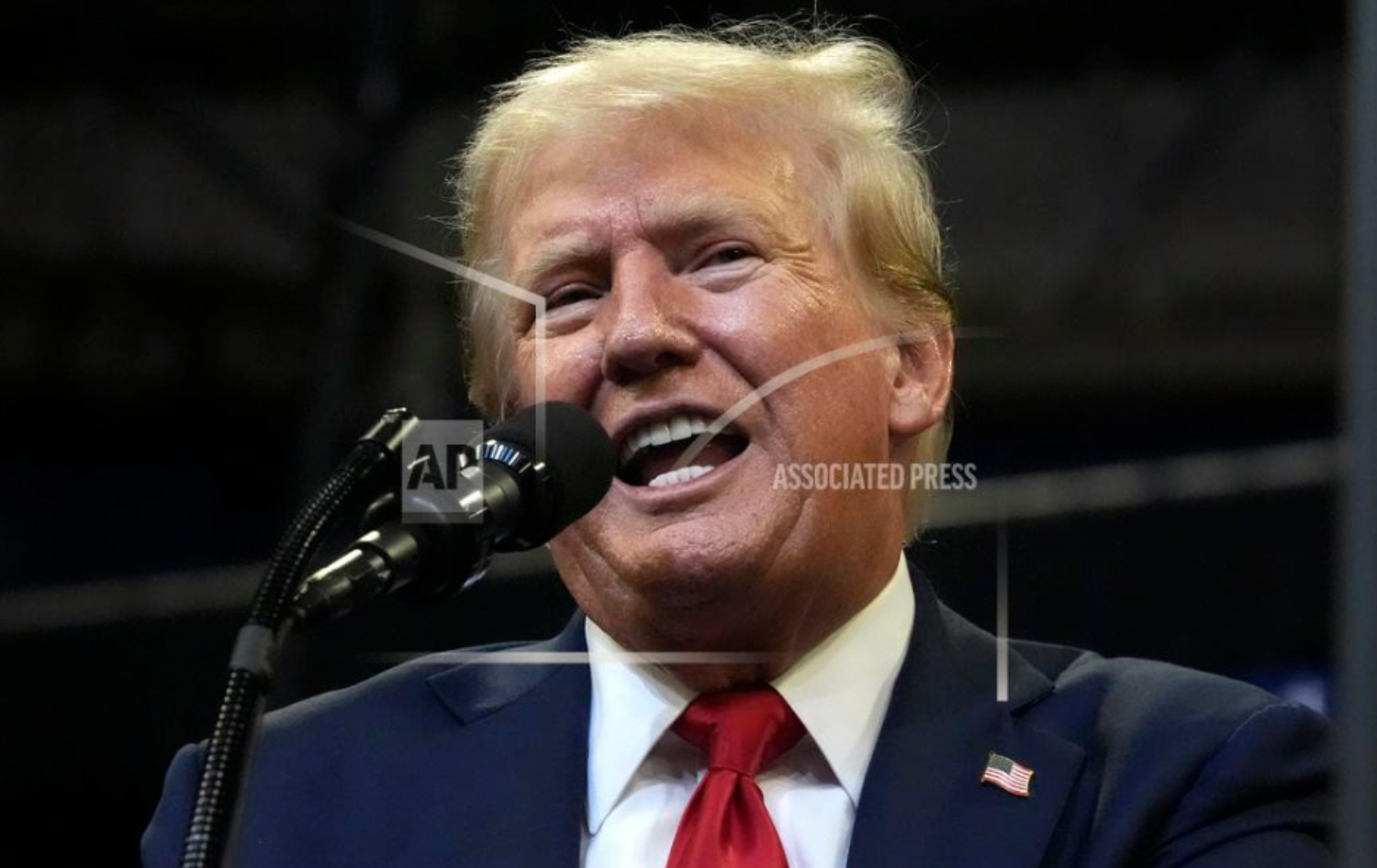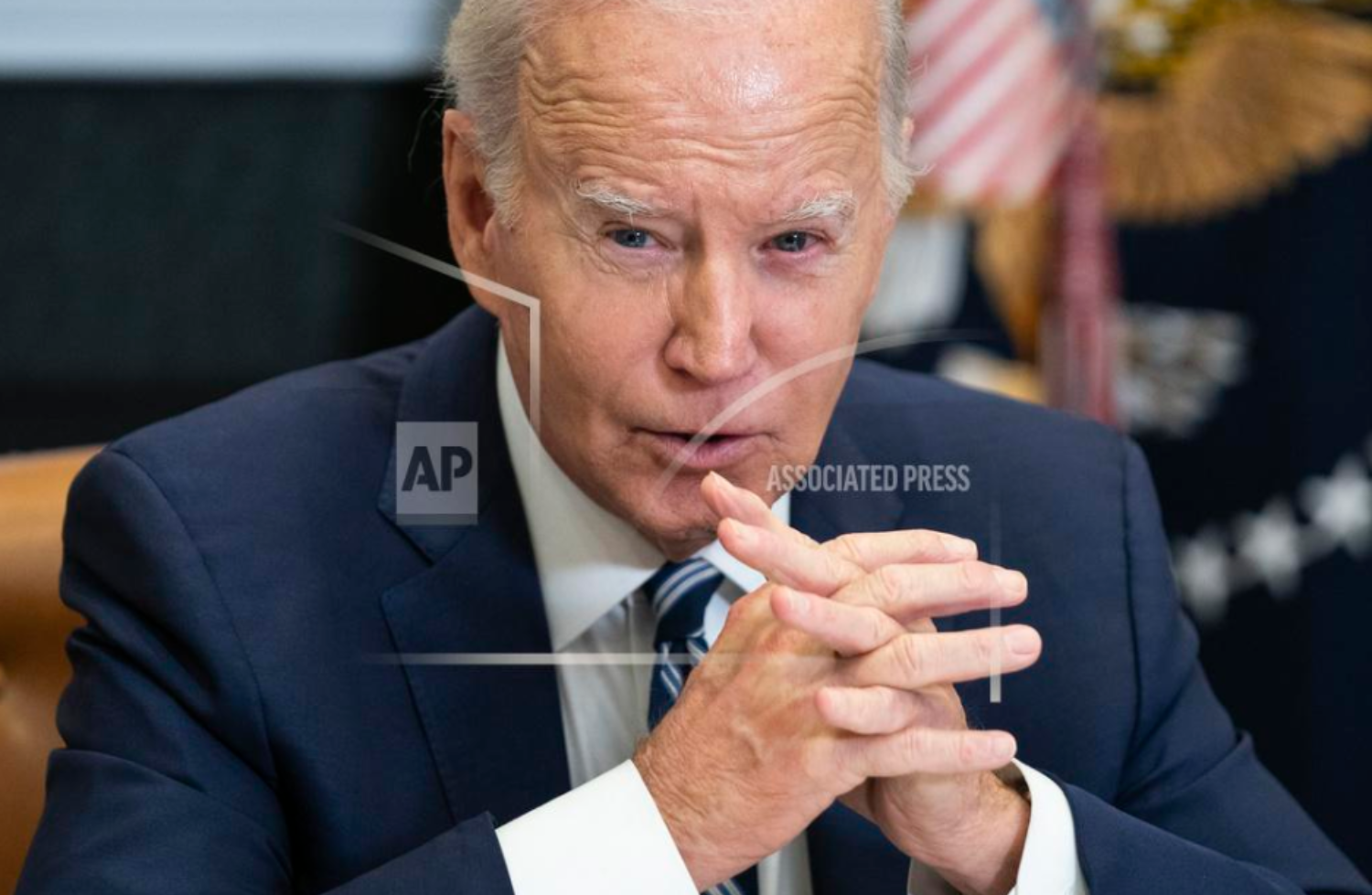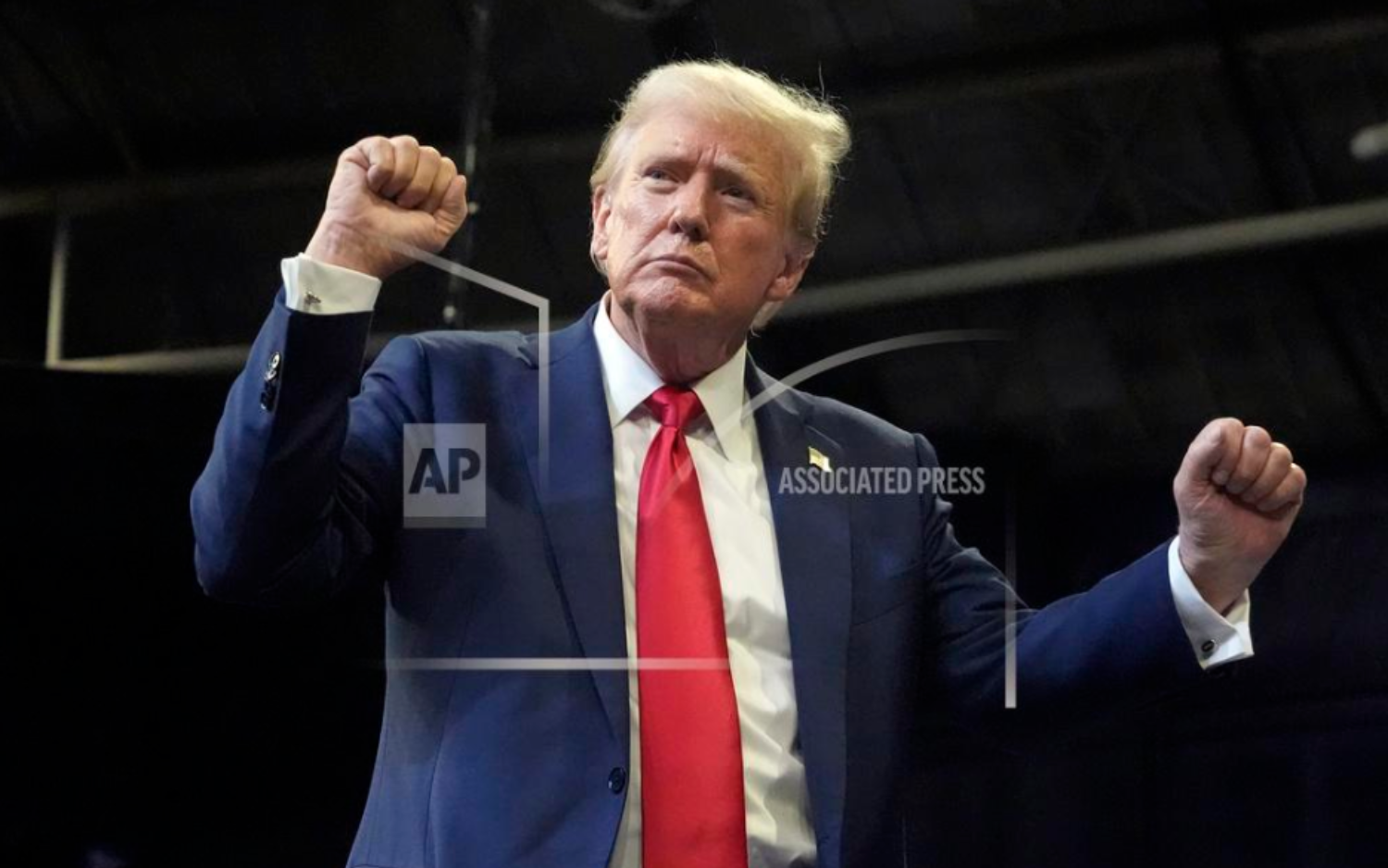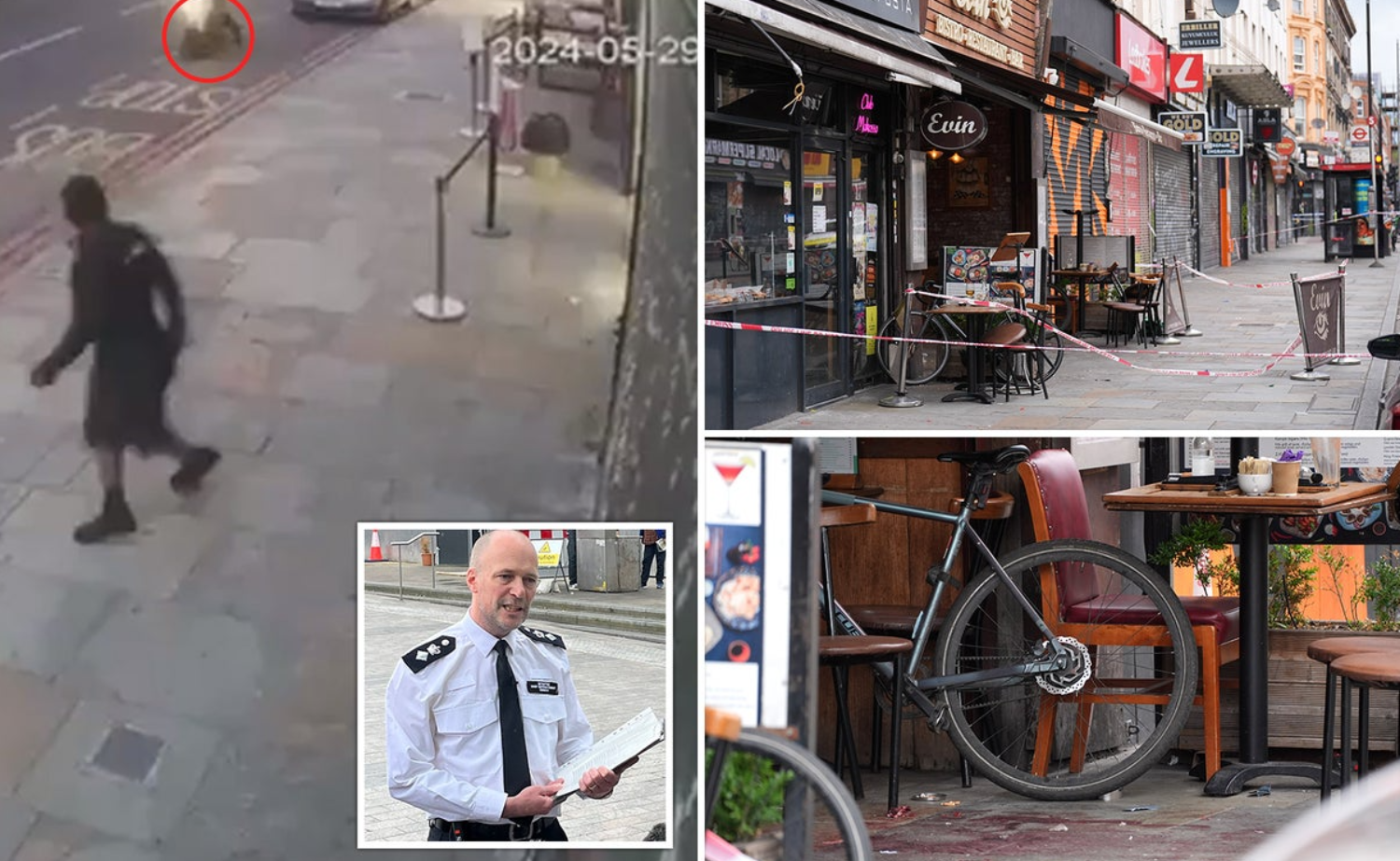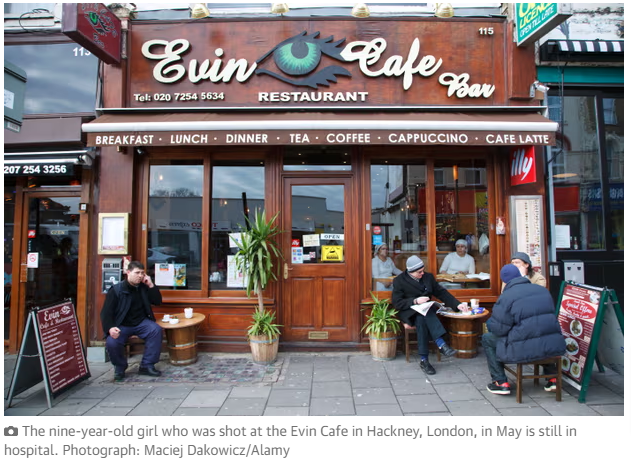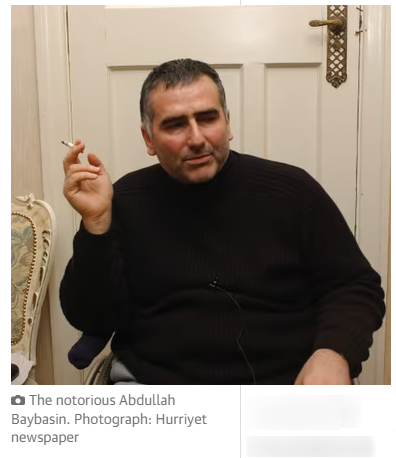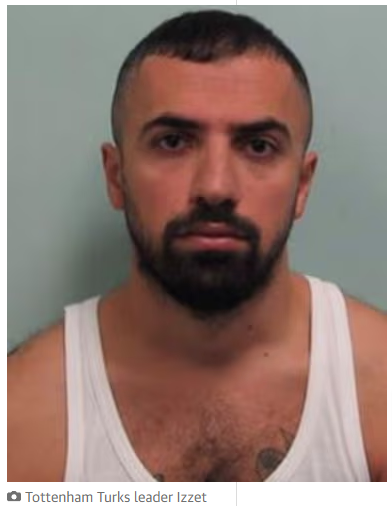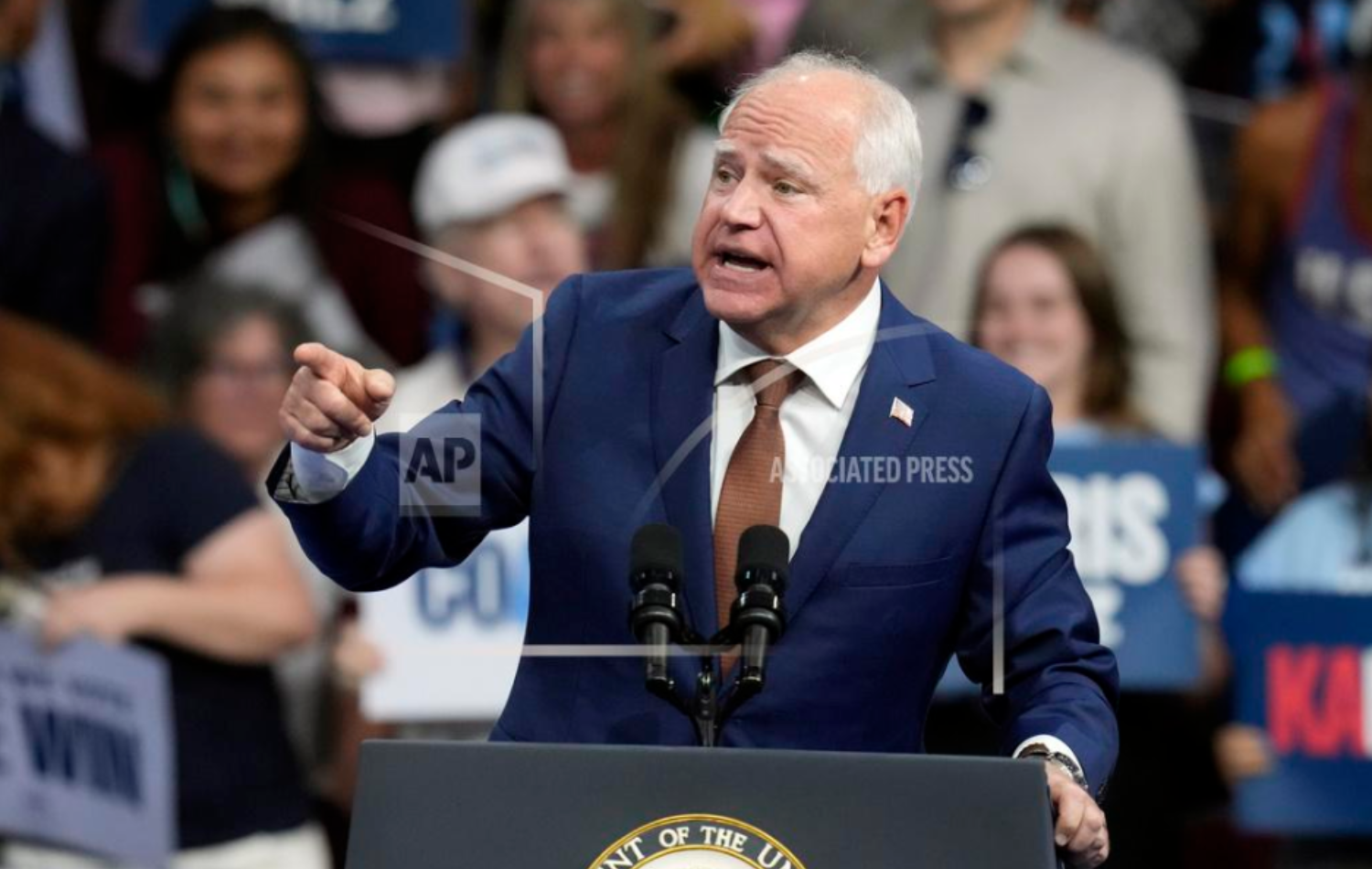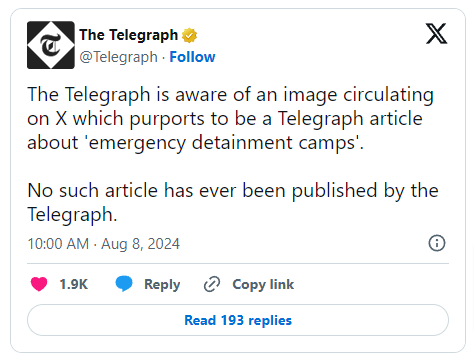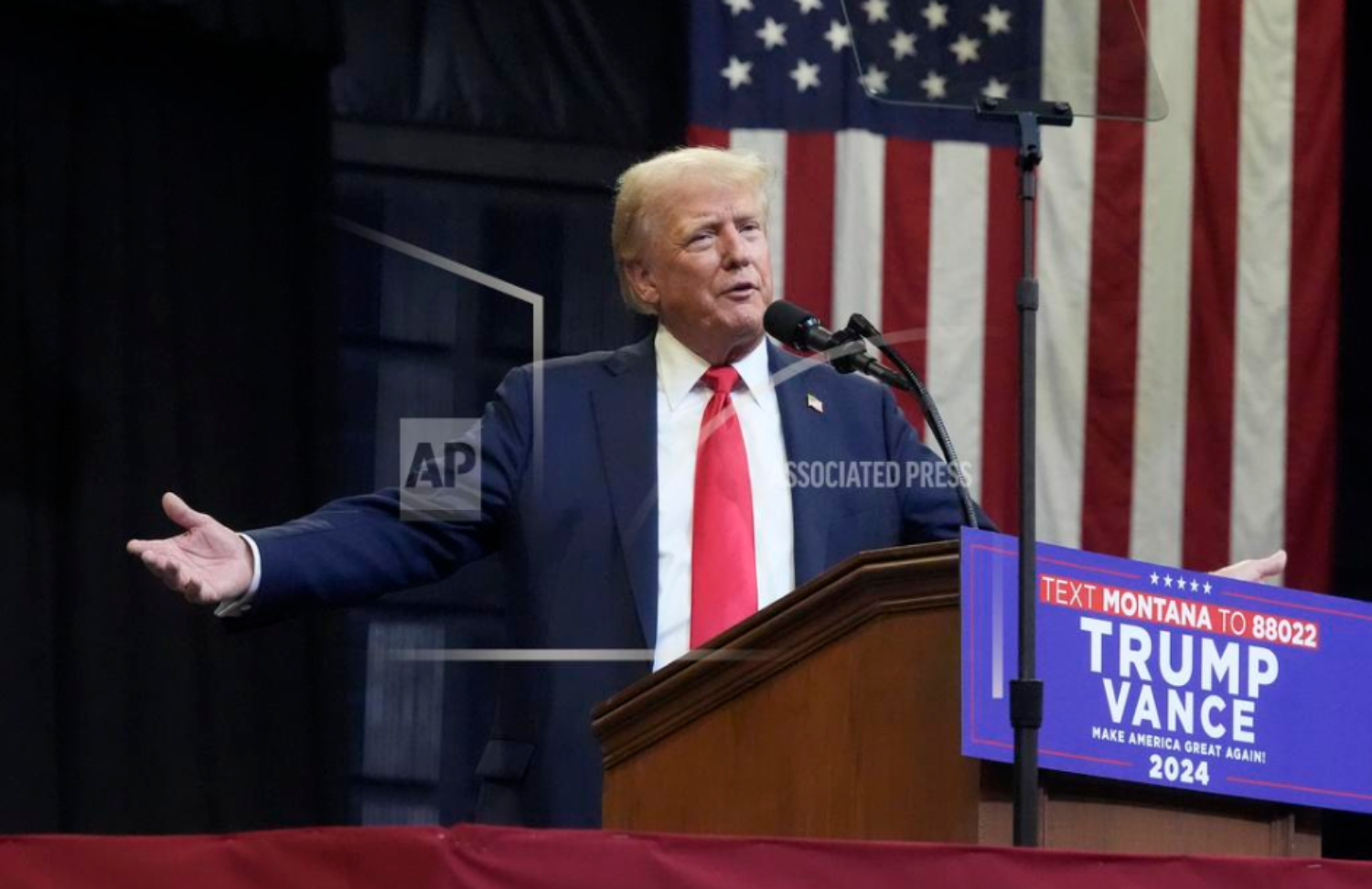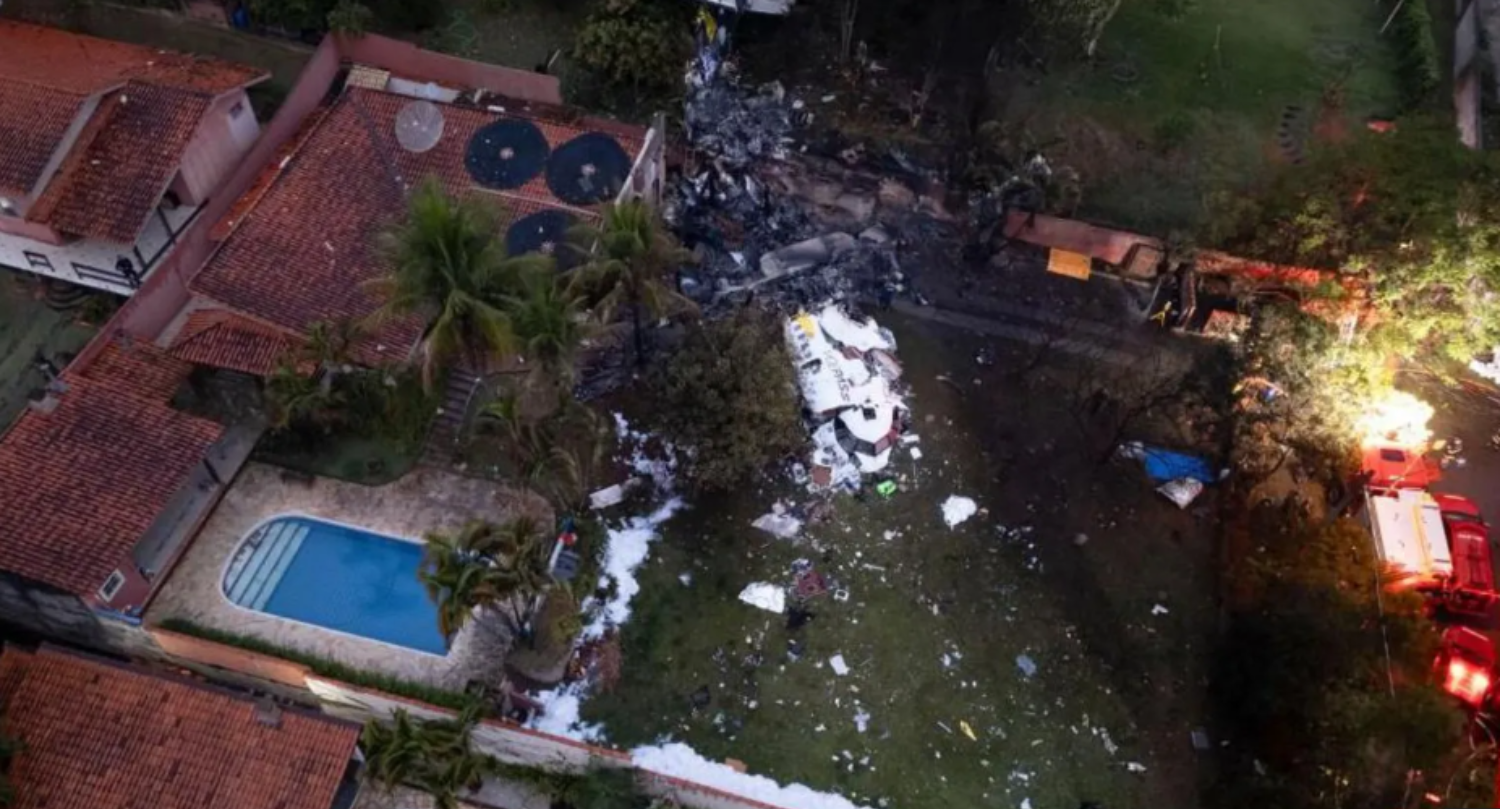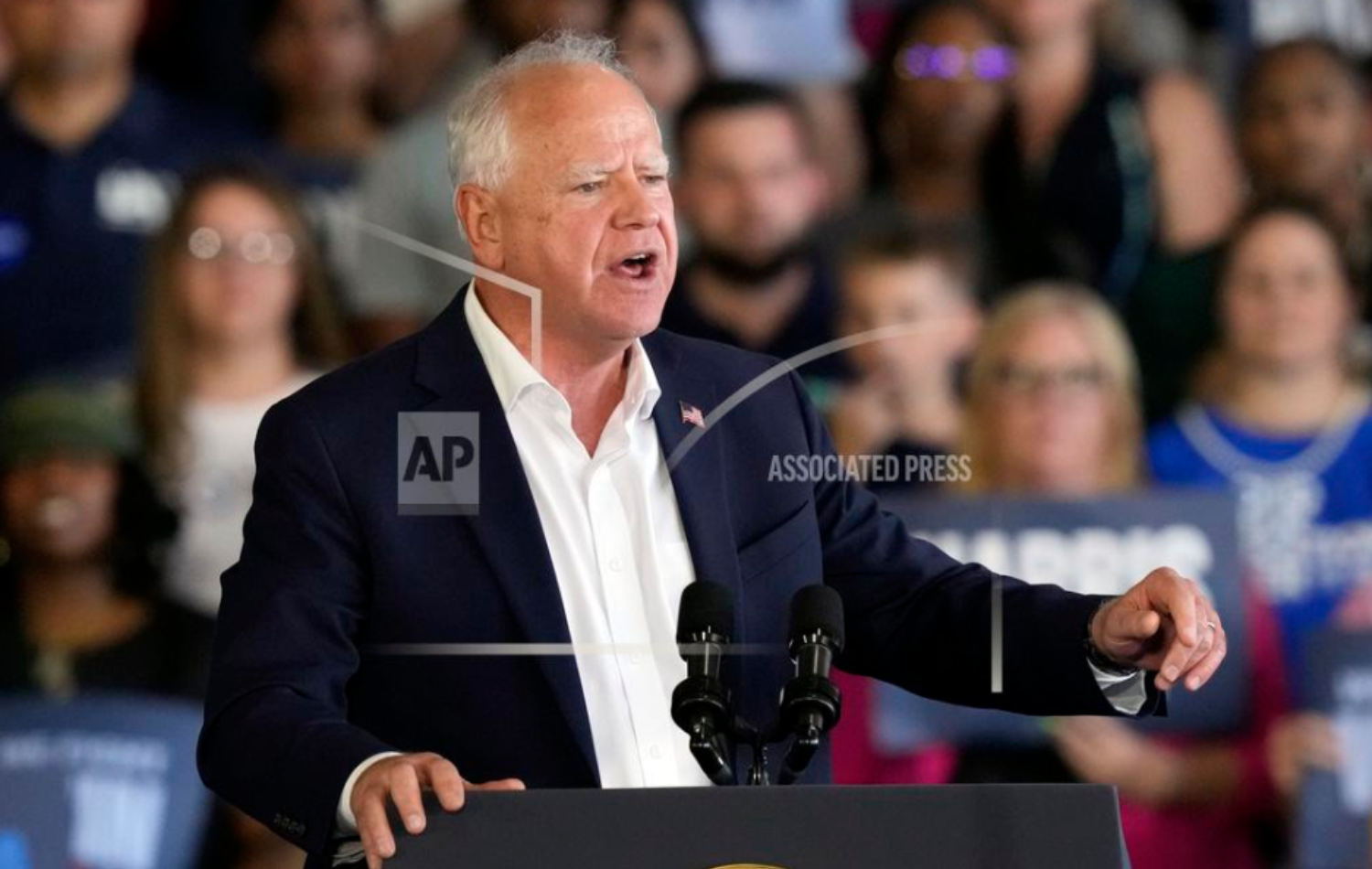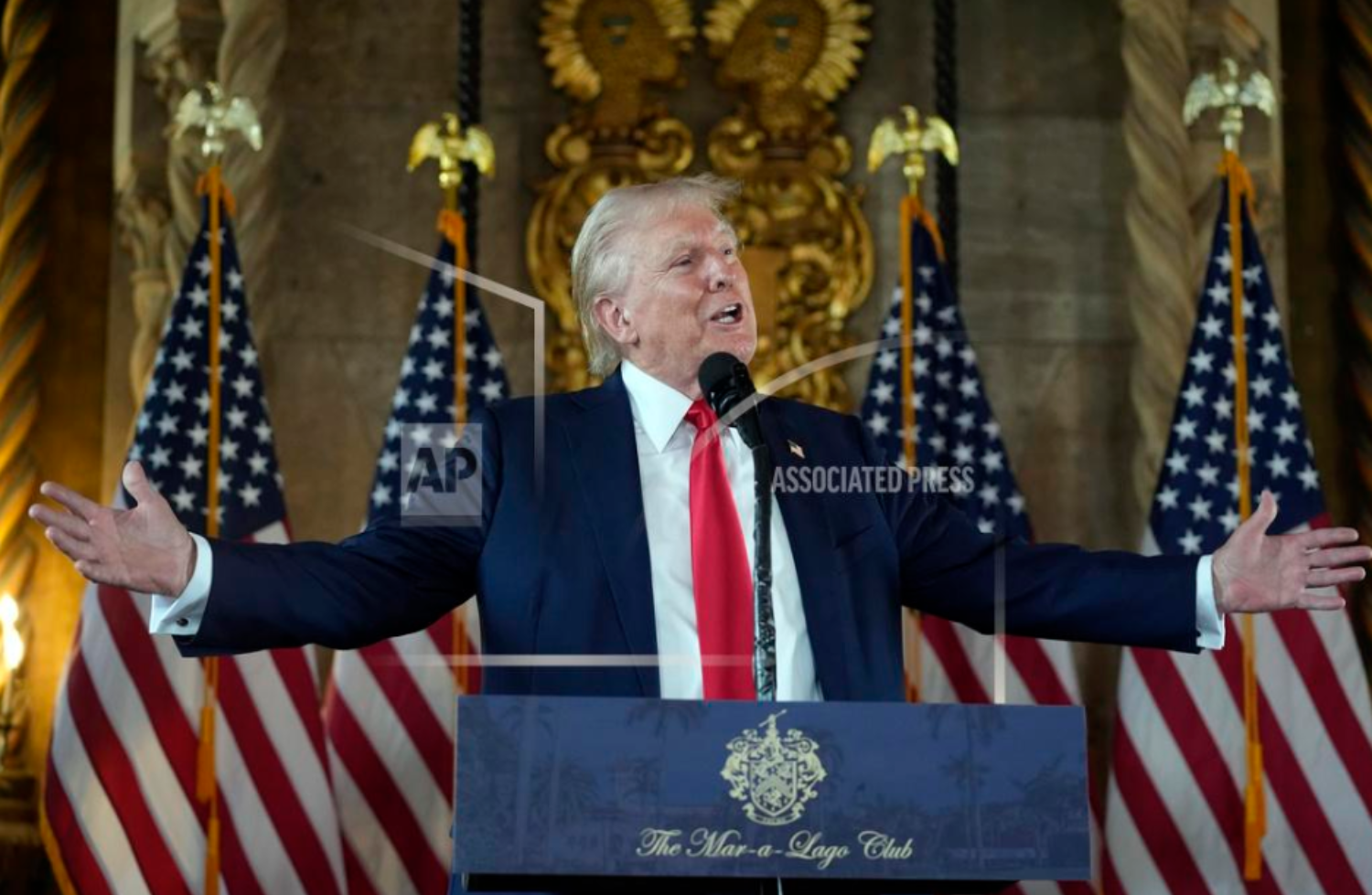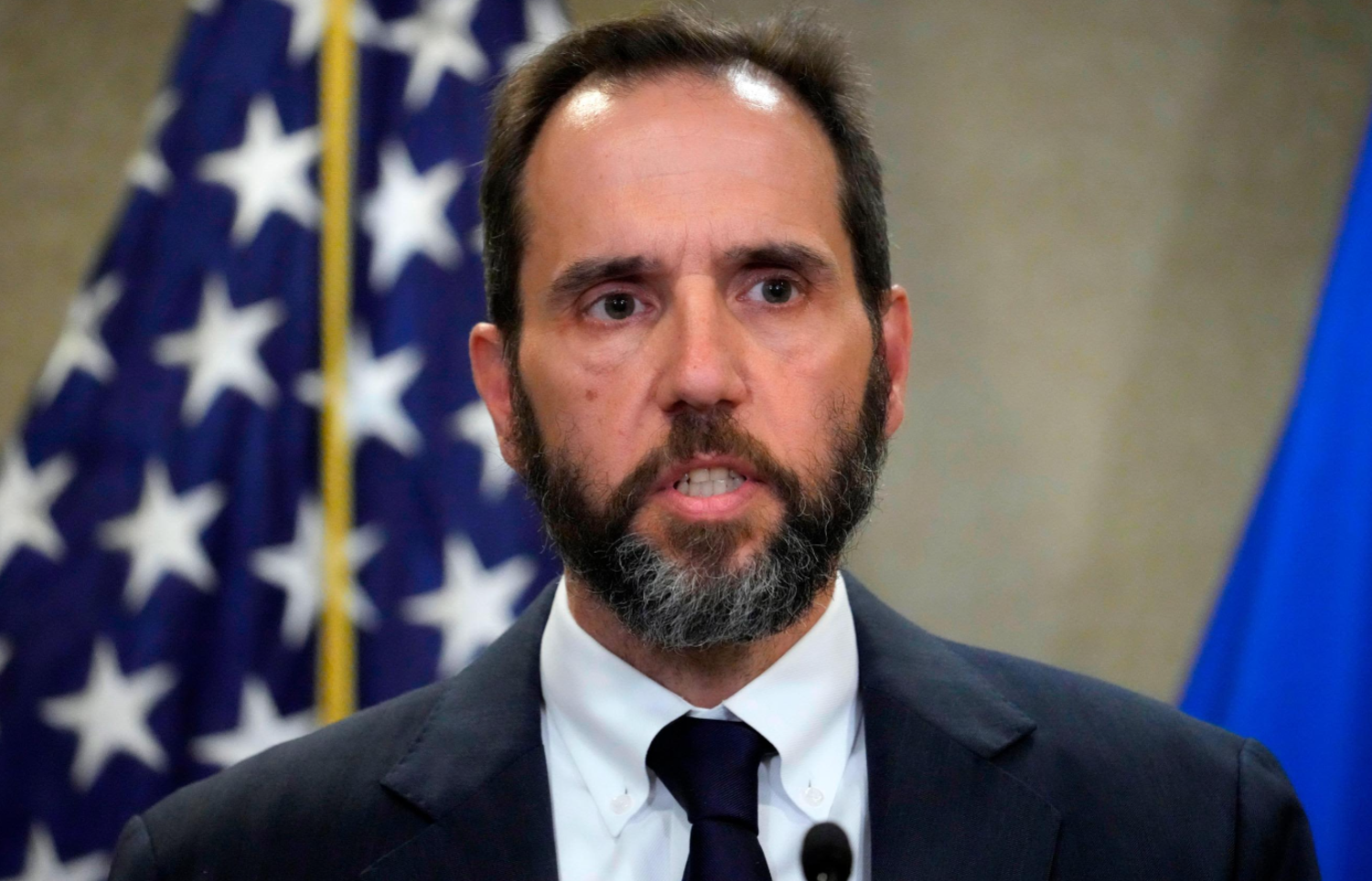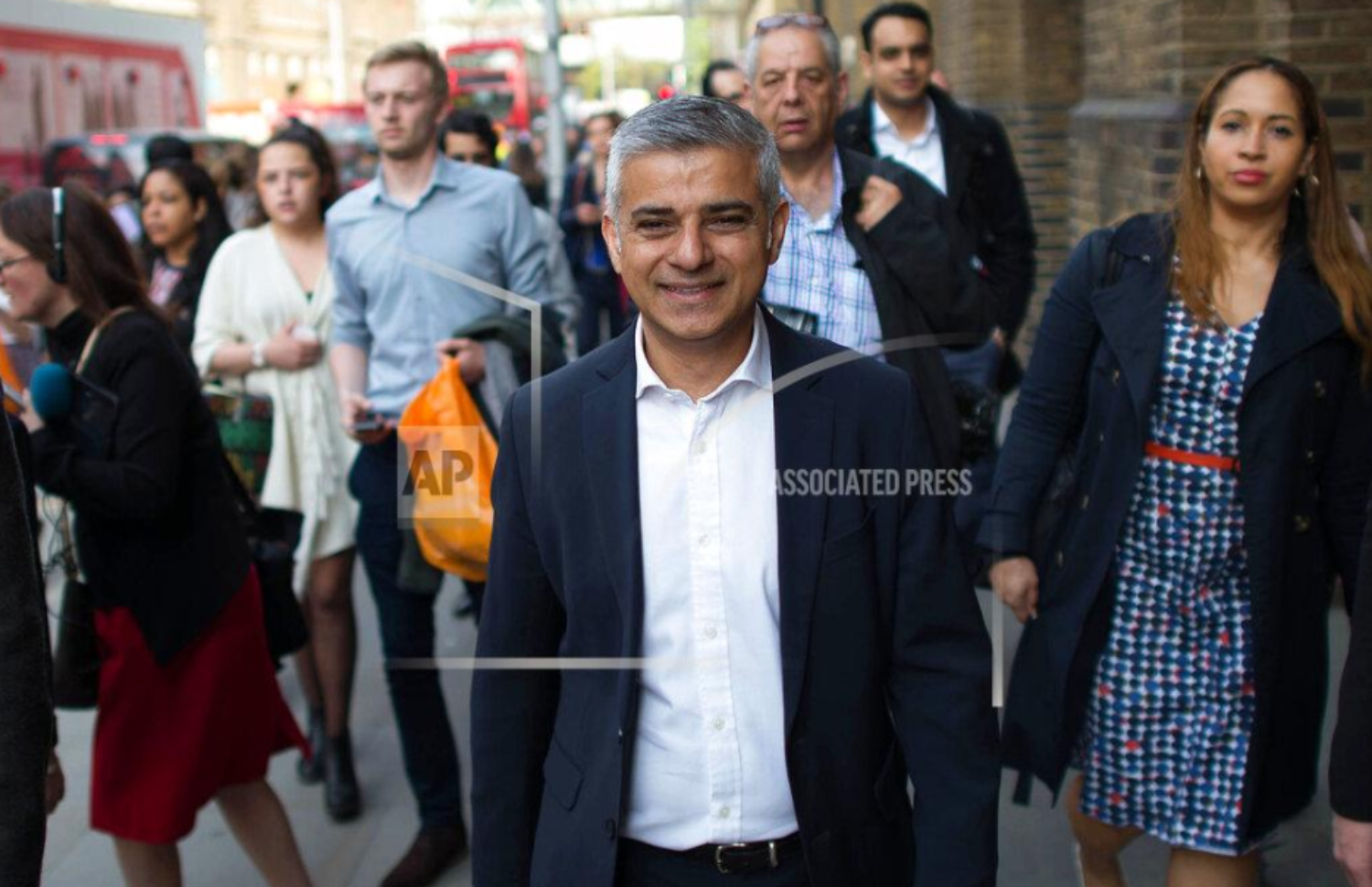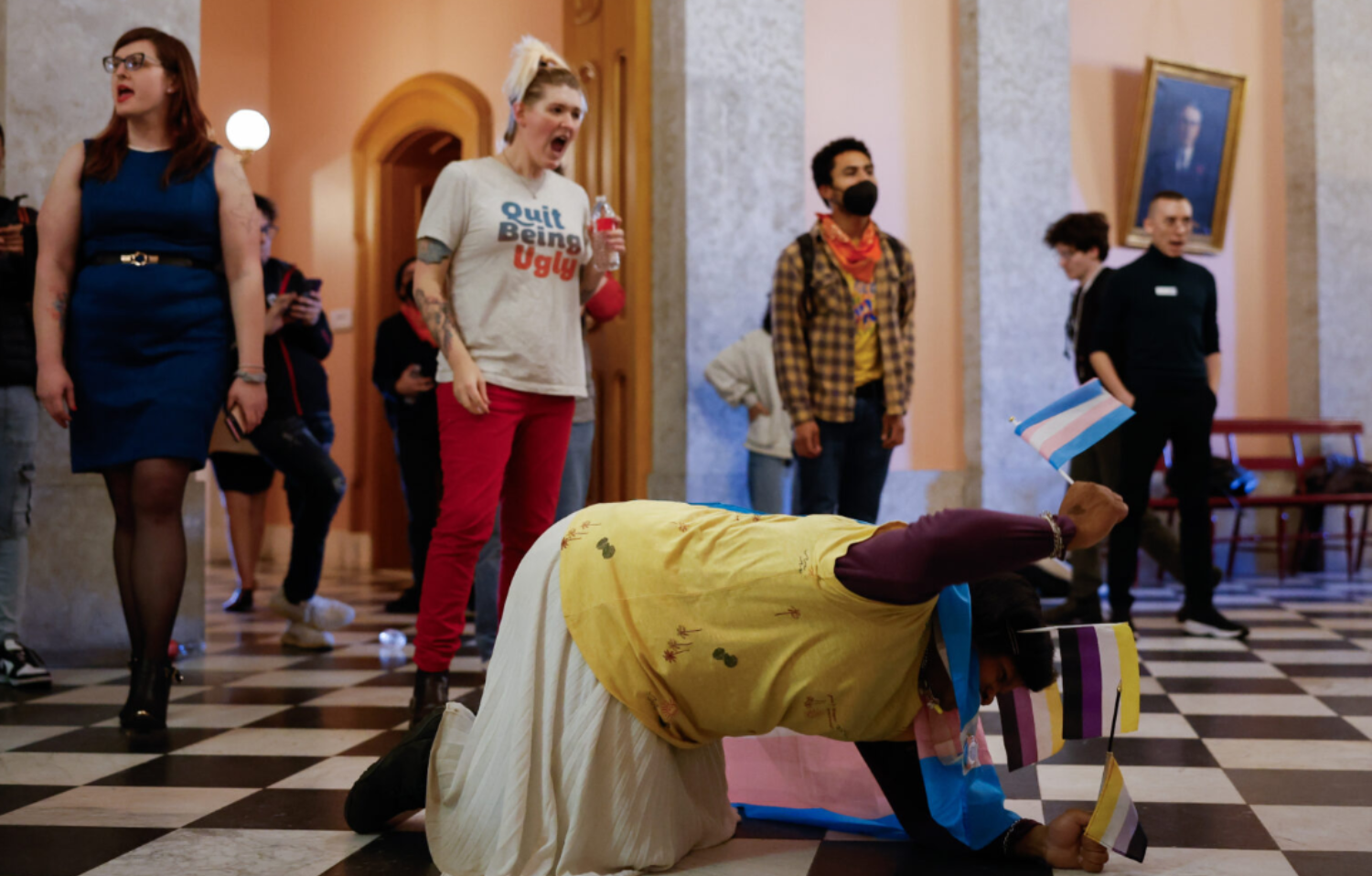-
Posts
10,090 -
Joined
-
Last visited
Content Type
Events
Forums
Downloads
Quizzes
Gallery
Blogs
Everything posted by Social Media
-
A United Nations counterterrorism official recently informed the Security Council of a significant and growing threat posed by the Islamic State group and its affiliates across various regions in Africa. The warning suggests that a substantial portion of the continent could potentially fall under the control of these extremist organizations if their influence continues to expand unchecked. This alarming situation is underscored by the activities of Islamic State militants, who have already established a visible presence in parts of the Middle East, such as the village of Maryam Begg in Kirkuk, Iraq, where they operate with impunity, flaunting their infamous black flag. This image, captured in September 2014, serves as a stark reminder of the group's enduring impact and reach. Vladimir Voronkov, the undersecretary for counterterrorism, presented a detailed report to the Security Council, outlining the expanding operations of Islamic State affiliates, particularly in West Africa and the Sahel region. According to Voronkov, these groups have "expanded and consolidated their area of operations" in these areas, and there is a real risk that a "vast territory stretching from Mali to northern Nigeria could fall under their effective control" if their influence continues to grow. The undersecretary further elaborated on the situation in other parts of the continent, where Islamic State affiliates have been expanding their operations. In countries like Mozambique, Somalia, and the Democratic Republic of the Congo, there has been a "dramatic increase in terrorist attacks" that have resulted in the deaths of large numbers of civilians. These developments highlight the growing reach and impact of these extremist groups in Africa, where they continue to exploit political instability, weak governance, and local grievances to establish and expand their influence. Voronkov also provided an update on the activities of ISIS-K, the Islamic State's affiliate in Afghanistan. He reported that the group has "improved its financial and logistical capabilities" over the past six months and has ramped up its recruitment efforts. The group's enhanced capabilities and increased recruitment suggest that it is positioning itself to carry out more significant and coordinated attacks in the future. Additionally, the Islamic State has demonstrated its global ambitions by claiming responsibility for ISIS-K attacks and increasing its operations in Iraq and Syria. The briefing to the Security Council came in the wake of an unrelated incident in Austria, where authorities foiled an alleged plot to attack Taylor Swift's concerts in Vienna. Although there was no known connection between the suspects in the plot and Islamic State or its affiliates, Austrian authorities noted that both individuals appeared to have been inspired by the ideology of the Islamic State group and al-Qaida. The growing influence of Islamic State affiliates across Africa, as detailed in Voronkov's report, is a cause for serious concern. If left unchecked, these groups could potentially establish control over vast territories, destabilizing entire regions and creating new fronts in the global fight against terrorism. The international community must take urgent and coordinated action to address this threat and prevent the further spread of extremist ideologies and violence across the continent. Credit: ABC News 2024-08-13 Get our Daily Newsletter - Click HERE to subscribe Cigna offers a variety of health insurance plans designed to meet the minimum requirement for medical treatment coverage, with benefits reaching up to THB 3 million. These plans are tailored to provide comprehensive healthcare solutions for expatriates, ensuring peace of mind and access to quality medical services. To explore the full range of Cigna's expat health insurance options and find a plan that suits your needs, click here for more information.
-
The serene and picturesque Åland Islands, with their red-granite shores and quiet fishing huts, have long been a symbol of peace and neutrality in the Baltic Sea. However, the geopolitical landscape has shifted dramatically since Russia's invasion of Ukraine and Finland's subsequent entry into NATO. Now, the islands find themselves on high alert, with increased sea surveillance and growing concerns about Russian espionage and sabotage. Lieutenant Juri Jalava of the Finnish coastguard is one of the key figures in this heightened state of vigilance. His patrols along the Baltic coastline have taken on a new urgency. Where once he was focused on inspecting pleasure boats and dealing with the occasional drunk tourist, today he is on the lookout for Russian spies or saboteurs. "Everything has become more intense," Lt Jalava said, as his patrol ship cruised past wind turbines near the Åland Islands. His small Border Guard unit has become critical in monitoring the waters around this autonomous Finnish territory, which, due to a Soviet-era security pact, remains completely demilitarized. The Åland Islands, with a population of around 30,000, are strategically significant despite their remote location. They lie at the entrance to the Gulf of Bothnia and the Gulf of Finland, making them a potential chokepoint for maritime traffic. Around 96 percent of Finland's trade passes through waters near the islands, further underscoring their importance. However, the islands' demilitarized status complicates their defense, leaving the Border Guard as the first line of protection against any potential Russian threat. The idea of re-militarizing the Åland Islands has gained traction among some Finnish defense and intelligence experts. Pekka Toveri, a former head of Finnish intelligence, has argued that re-arming the islands would enhance Finland's ability to respond to threats and increase the safety of the islanders and the wider region. Some have even gone so far as to describe the Åland Islands as the Baltic's "Achilles heel," warning that whoever controls them could block access to critical maritime routes. A key concern for Lt Jalava and his team is the presence of "loitering" boats and ships that might be attempting to cut undersea cables or damage other critical infrastructure. Such acts of sabotage are seen as part of Russia's hybrid war against Europe, a strategy aimed at destabilizing the West in response to its support for Ukraine. In October 2023, the Balticconnector, a 77km-long gas pipeline connecting NATO members in the Baltic Sea, was mysteriously damaged, with Russia as the prime suspect. These threats are not limited to the Åland Islands. Finland has also had to close its 1,300 km-long border with Russia in response to Moscow's attempts to push migrants and asylum seekers across the frontier. Another issue is Russia's so-called shadow fleet—a collection of aging, foreign-flagged tankers that evade sanctions by transporting goods to Russia. While these ships typically skirt Finland's territorial waters, they pose significant environmental hazards due to their poor condition. Despite the rising tensions, the residents of the Åland Islands have shown little interest in re-militarizing their homeland. The islands have a strong tradition of independence and a deep-seated commitment to their demilitarized status. Jörgen Pettersson, the speaker of the Åland Islands parliament, remains confident that the current security arrangement is sufficient. "We’re not naive, we’re following very carefully what’s happening, but we are convinced our internationally agreed solution is good enough, so the islanders don’t have to be afraid," Pettersson said. There is also skepticism about whether re-armament would make the islands any safer. Finland is already committed to defending the islands with its navy, and as a NATO member, it can call on the alliance for support if necessary. "It’s not true that it’s a black hole," said Minna Ålander, a Finnish security expert. "Just because it is demilitarized, it doesn’t mean there are not plans to defend it." Finnish officials are also reluctant to break the treaty that keeps the Åland Islands demilitarized, as they value their country's reputation for adhering to international agreements. Finland is consistently ranked as one of the least corrupt countries in the world, and its leaders are committed to maintaining a rules-based order. This moral high ground would be jeopardized if they unilaterally sent troops to the Åland Islands. Nevertheless, concerns about Russia's intentions persist. Mikael Boden, the head of the Swedish armed forces, has warned that Russian President Vladimir Putin has "both eyes" on Gotland and "probably...the Åland Islands as well." A recent joint statement by British and Baltic diplomats suggested that Russia may eventually pivot from its war in Ukraine to an "existential" invasion of the Baltic Sea region. Finnish and Estonian diplomats have echoed these concerns, warning that Russia is probing defenses in the Baltic region as part of early planning for a potential NATO-Russia conflict. In recent months, Moscow has reignited border disputes with Finland and Estonia, including a proposal to revise its sea frontier with Finland and the removal of sea buoys in Estonian waters. Back on the Åland Islands, the local population has been vocal in its opposition to Russia's actions. For the past 900 days, residents have gathered outside the Russian consulate each evening at 5 pm to protest the invasion of Ukraine. Bearing placards that read "Putin go home" and "murderers, leave Ukraine," the islanders have made their stance clear. Some even encourage tourists arriving on nearby ferries to join the protests. For many residents, the memories of past conflicts with Russia are still vivid. Anne-Maj Morn, 80, whose father survived several close calls during the 1939 Winter War against the Soviet Union, is a regular participant in the protests. "One way or another we hope there will be a solution – but of course that’s too optimistic as long as Putin is in power," she said. Another islander, Harriet Tuomien, 78, expressed her fears more starkly: "If the war in Ukraine goes wrong, maybe Russia will go further to try and get more land." As tensions continue to simmer in the Baltic region, the Åland Islands remain a focal point of concern. The islanders may be steadfast in their commitment to peace, but the geopolitical realities of the region suggest that their tranquil shores could once again become a frontline in Europe's ongoing struggle with Russian aggression. Credit: Daily Telegraph 2024-08-13 Get our Daily Newsletter - Click HERE to subscribe Cigna offers a variety of health insurance plans designed to meet the minimum requirement for medical treatment coverage, with benefits reaching up to THB 3 million. These plans are tailored to provide comprehensive healthcare solutions for expatriates, ensuring peace of mind and access to quality medical services. To explore the full range of Cigna's expat health insurance options and find a plan that suits your needs, click here for more information.
-
Recent research has revealed that the waters surrounding Australia's Great Barrier Reef have warmed to levels not seen in the past 400 years. This alarming trend, which has been particularly evident over the past decade, poses a significant threat to the world’s largest coral reef system. The Great Barrier Reef, a living ecosystem that extends approximately 1,500 miles (2,400 kilometers) along the coast of Queensland, is now under severe threat due to these rising temperatures. This study stands out for its historical perspective on the impact of man-made climate change. Unlike many previous surveys that focused on more recent damage to the reef, this research delves into a much longer timeline. A team of scientists from various Australian universities conducted the research by drilling cores into the coral. By analyzing these samples, they were able to track summer ocean temperatures dating back to 1618, using a method similar to counting the rings of a tree. Their findings, combined with data from ships and satellites over the past century, present a clear picture: ocean temperatures were stable for hundreds of years, only beginning to rise significantly around 1900. This upward trend coincides with the increased influence of human activities on the environment, underscoring the profound impact of industrialization and greenhouse gas emissions on the planet's ecosystems. Between 1960 and 2024, the researchers observed an average annual warming of 0.12°C (0.22°F) per decade from January to March. This gradual but steady increase in temperature has had devastating effects on the Great Barrier Reef. Since 2016, the reef has endured five summers of mass coral bleaching. This phenomenon occurs when corals, under heat stress, expel the symbiotic algae living within them, causing the corals to turn white. Bleached corals are not only more susceptible to disease and death but also lose their vibrant colors, which are a major draw for tourists. These five summers of mass bleaching coincided with five of the six warmest years in the past 400 years, according to the study. The most recent temperature data, from January to March 2024, was the highest on record and significantly surpassed previous years. "The world is losing one of its icons," said Benjamin Henley, an academic at the University of Melbourne and one of the study's co-authors. "I find that to be an absolute tragedy. It's hard to understand how that can happen on our watch in our lifetime. So it's very, very sad." The implications of this warming trend extend beyond the health of the reef itself. Coral reefs play a crucial role in protecting shorelines from erosion, providing habitat for thousands of fish species, and supporting the tourism industry. The Great Barrier Reef alone contributes approximately A$6.4 billion (US$4.2 billion) to the Australian economy each year. Its decline could have serious economic consequences for the region, in addition to its environmental impact. The situation is not unique to Australia. The U.S. National Oceanic and Atmospheric Administration (NOAA) has reported that at least 54 countries and regions have experienced mass bleaching of their reefs since February 2023, as climate change continues to warm the ocean's surface waters. This widespread bleaching is a stark reminder of the global nature of the climate crisis and its far-reaching effects on marine ecosystems. Despite the dire situation, the Great Barrier Reef is not currently on UNESCO's list of World Heritage sites in danger. However, the UN has recommended that it be added to the list, given the mounting evidence of its vulnerability. Australia has lobbied extensively to keep the reef off the endangered list, fearing that such a designation could harm the tourism industry, which relies heavily on the reef’s allure. Lissa Schindler, the Great Barrier Reef campaign manager at the Australian Marine Conservation Society, emphasized the urgent need for Australia to take more aggressive action to combat climate change. "Australia must increase its ambition, action, and commitments to battle climate change and protect our greatest natural asset," she said. The future of the Great Barrier Reef hangs in the balance, as rising ocean temperatures continue to push this natural wonder to its limits. The study serves as a poignant reminder of the importance of addressing climate change now to preserve not only the reef but also the countless ecosystems and communities that depend on it. Credit: AXIOS 2024-08-12 Get our Daily Newsletter - Click HERE to subscribe Cigna offers a variety of health insurance plans designed to meet the minimum requirement for medical treatment coverage, with benefits reaching up to THB 3 million. These plans are tailored to provide comprehensive healthcare solutions for expatriates, ensuring peace of mind and access to quality medical services. To explore the full range of Cigna's expat health insurance options and find a plan that suits your needs, click here for more information.
-
As the 2024 election approaches, Donald Trump is centering his campaign on a bold and controversial promise: to carry out the largest deportation program in American history. Signs at the Republican National Convention boldly proclaimed "Mass Deportation Now!", signaling a full embrace of Trump's plan to expel millions of migrants from the United States. However, this aggressive stance has sparked concern among some Republicans, who worry about the implications of such a policy. Lauren B. Peña, a Republican activist from Texas, voiced her discomfort with the rhetoric surrounding mass deportations at the convention. Terms like "illegals" and "invasion" being thrown around made her uneasy. Peña, like some Republicans in Congress who have advocated for more balanced approaches to immigration, hopes that Trump is merely posturing. She believes that his focus will be on deporting criminals and sex offenders rather than targeting every family that crosses the border. Despite these hopes, Trump and his advisers seem committed to a more sweeping approach. Trump has placed immigration at the forefront of his campaign, pushing the Republican Party toward a strategy reminiscent of the 1950s. This strategy harkens back to former President Dwight D. Eisenhower's deportation policy, infamously known as "Operation Wetback," a term now recognized as a racial slur. In a 2023 interview with Time Magazine, Trump suggested that he would use the National Guard, and possibly even the military, to deport between 15 million and 20 million people. This is despite the government's estimate that in 2022, around 11 million migrants were living in the U.S. without permanent legal permission. Trump's plans have raised the stakes in the upcoming election, going beyond the longstanding conservative priority of fortifying the southern border. His proposals prompt a fundamental question about America's approach to immigration: Should the country undertake a massive deportation effort that would affect millions of people? The Biden administration's handling of the southern border has seen historic numbers of crossings, which has prompted a rightward shift in the Democratic Party's stance on immigration. Democrats have increasingly led with promises of border security before addressing the needs of immigrants already in the country. As both parties gear up for the November election, they are keenly aware of the importance of Latino voters, especially in swing states. In the 2020 election, Trump won 35% of Hispanic voters, according to AP VoteCast. Support for stronger border enforcement has grown among Hispanic voters, but an analysis by the AP-NORC Center for Public Affairs Research shows that about half of Hispanic Americans hold a somewhat or very unfavorable view of Trump. Despite this, Peña, who describes herself as a multiracial Hispanic person, has become an enthusiastic supporter of the GOP. She was drawn to Trump after witnessing the impact of drug addiction in the public housing complex where she lives in Austin. Peña feels that government programs have failed to help low-income people and that the recent surge in migration has strained public assistance programs like food stamps. However, Peña is also concerned when fellow Republicans discuss more extreme ideas, such as barring children without permanent legal status from public schooling. As a Hispanic person, she finds the topic difficult and believes that these individuals should be given a chance. Nevertheless, many GOP lawmakers have largely supported Trump's plans, viewing them as necessary. House Speaker Mike Johnson, R-La., stated in a July interview at the conservative Hudson Institute that such measures are needed. Some Republicans have expressed tacit skepticism, suggesting more modest goals. Senator James Lankford, an Oklahoma Republican, noted that over 1 million people have already received final orders of removal from an immigration judge. He pointed out the logistical and financial challenges of targeting this group alone. Lankford, who negotiated a bipartisan border package that Trump opposed earlier in the year, emphasized the difficulty of executing a mass deportation program on such a large scale. Other Republicans, including Florida Senator Marco Rubio and Representative Mario Diaz Balart, have suggested that Trump would prioritize deporting migrants with criminal backgrounds. Trump entered office in 2016 with similar promises of mass deportation but only succeeded in deporting about 1.5 million people during his first term. This time, however, Trump appears to have a more detailed plan. Stephen Miller, a former top aide who is expected to play a senior role in a potential Trump administration, has described a vision of a government working with "utter determination" to achieve two main goals: "Seal the border. Deport all the illegals." To accomplish this, Trump has proposed reviving travel bans from countries deemed undesirable, such as majority-Muslim nations. He has also suggested launching a sweeping operation to round up immigrants using the National Guard, detaining them in massive camps, and deporting them before they have the opportunity to make legal appeals. Beyond deportation, Trump has pledged to end birthright citizenship, a 125-year-old right in the U.S. Several of his top advisers have outlined a broader policy vision through the Heritage Foundation's Project 2025, which aims to reduce legal migration significantly. This plan could also end temporary programs for over 1 million migrants, including DACA recipients, Ukrainians and Afghans fleeing conflict, and others granted temporary protection due to unrest in their home countries. The potential consequences of these policies are significant, particularly in industries like housing and agriculture that rely heavily on immigrant labor. Jorge Franco, CEO of the Hispanic Chamber of Commerce of Wisconsin, warned that the state's economy would suffer if the 75,000-plus immigrants who perform essential work in Wisconsin's dairy and agriculture sectors were suddenly deported. Representative Maria Elvira Salazar, a Florida Republican who has advocated for legislation providing a path to citizenship for longtime residents, acknowledged that large-scale deportations might be necessary due to recent border surges. However, she also expressed hope that Trump would differentiate between recent arrivals and those who have lived in the U.S. for years. Salazar emphasized the importance of considering the needs of the business community, particularly in industries like construction and farming that rely on immigrant labor. Meanwhile, Democrats believe that Trump's threats of mass deportation are galvanizing Latino voters. María Teresa Kumar, CEO of Voto Latino, a leading voter registration organization supporting Democratic candidate Kamala Harris, noted that the prospect of mass deportations has put many people on high alert. Since Harris rose to the top of the Democratic ticket, Voto Latino has seen a surge in voter registrations, with nearly 36,000 new voters registered in just a few weeks, almost matching their total from the first half of the year. In a heavily Latino House district on the southern tip of Texas, Democratic Representative Vicente Gonzalez observed that while voters want better border management, many also have friends or family members who lack proper immigration documentation. Gonzalez argued that more could be done to implement effective border policies, but mass deportation is not the solution, as it causes significant anxiety within communities. As the 2024 election draws near, the debate over immigration and mass deportation continues to divide the Republican Party and the nation. While Trump’s hardline approach appeals to a segment of the GOP base, it also raises concerns about the practical and moral implications of such policies. At the same time, Democrats are leveraging these fears to mobilize voters, particularly within the Latino community. The outcome of this debate could shape the future of immigration policy in the United States for years to come. Credit: WP 2024-08-12 Get our Daily Newsletter - Click HERE to subscribe Cigna offers a variety of health insurance plans designed to meet the minimum requirement for medical treatment coverage, with benefits reaching up to THB 3 million. These plans are tailored to provide comprehensive healthcare solutions for expatriates, ensuring peace of mind and access to quality medical services. To explore the full range of Cigna's expat health insurance options and find a plan that suits your needs, click here for more information.
-
The Biden-Harris administration has embarked on a path that defies established law by attempting to extend ObamaCare subsidies to beneficiaries of the Deferred Action for Childhood Arrivals (DACA) program. This move, which is arguably one of the most controversial in a series of executive actions taken by this administration, raises serious legal and constitutional concerns. Notably, many of the administration's executive actions have already been struck down by federal courts, further highlighting the contentious nature of this recent initiative. The Personal Responsibility and Work Opportunity Act of 1996 is a pivotal piece of legislation that clearly prohibits providing public benefits to individuals who are in the United States illegally. However, the Department of Health and Human Services (HHS) has introduced a new regulation that seeks to extend ObamaCare subsidies to DACA recipients. The HHS justifies this by declaring that DACA beneficiaries are "lawfully present," and therefore eligible for these taxpayer-funded healthcare subsidies. This rationale is highly questionable. The very premise of DACA is that it defers the deportation of individuals who are not lawfully present in the United States. To qualify for DACA status, an individual must have entered the U.S. illegally. The 2012 memo that established DACA makes it explicitly clear that the program "confers no substantive right, immigration status or pathway to citizenship. Only the Congress, acting through its legislative authority, can confer these rights." Moreover, at least two federal courts have ruled that DACA itself is illegal, further complicating the administration's attempt to grant these individuals access to ObamaCare subsidies. The implications of the new Biden-Harris rule could be far-reaching, particularly concerning the ongoing crisis at the U.S. border. The prospect of taxpayer-subsidized healthcare could serve as an incentive for more individuals to attempt to enter the country illegally. The message that illegal behavior will be rewarded with public benefits is likely to resonate in the home countries of potential illegal immigrants, encouraging more people to make the dangerous journey to the U.S. Kamala Harris, who has been designated as the administration's lead on immigration issues, has overseen a period during which U.S. Customs and Border Protection (CBP) has recorded unprecedented numbers of encounters with individuals crossing the border illegally. On average, CBP reports more than 200,000 such encounters each month, with some months surpassing 300,000. These figures do not even account for the individuals who manage to evade apprehension altogether, suggesting that the actual number of illegal entries is even higher. The American public deserves a more effective and lawful approach to immigration. It is fundamentally unjust for illegal aliens to receive a "free pass" into the country, let alone access to taxpayer-funded benefits upon their arrival. The Biden-Harris administration's attempt to extend ObamaCare subsidies to DACA recipients represents a clear violation of federal law, and it is imperative that this illegal regulation be stopped before it goes into effect. As part of the effort to prevent this regulation from being implemented, a multistate lawsuit has been initiated. This legal challenge seeks to uphold the rule of law and protect the interests of American citizens who expect their government to enforce immigration laws fairly and consistently. The outcome of this lawsuit could have significant implications for the future of immigration policy in the United States and the ongoing debate over the limits of executive authority. In conclusion, the Biden-Harris administration's attempt to extend ObamaCare subsidies to DACA recipients is not only illegal but also poses a serious threat to the integrity of the U.S. immigration system. The American people deserve a government that respects the rule of law and prioritizes the interests of its citizens over those who have entered the country illegally. This lawsuit is a crucial step in ensuring that the administration's overreach is checked and that federal law is upheld. Credit: WSJ 2024-08-12 Get our Daily Newsletter - Click HERE to subscribe Cigna offers a variety of health insurance plans designed to meet the minimum requirement for medical treatment coverage, with benefits reaching up to THB 3 million. These plans are tailored to provide comprehensive healthcare solutions for expatriates, ensuring peace of mind and access to quality medical services. To explore the full range of Cigna's expat health insurance options and find a plan that suits your needs, click here for more information.
-
Trump has made crowd size a central talking point in his political narrative. Now, the Democrats, particularly through the candidacy of Kamala Harris, are embracing this tactic, turning the spotlight back on Trump in a game he has long dominated. The rise of Kamala Harris as a presidential candidate has attracted significant attention, not just for her policies or speeches, but for the throngs of supporters she has managed to gather at her campaign rallies. Tim Walz, during a Friday night rally with Vice President Harris, couldn't resist taking a page out of Trump's playbook. He openly bragged about the size of the crowds they had been drawing, signaling a shift in how Democrats are approaching the topic of crowd size. In Philadelphia, the new Democratic ticket managed to pack a 10,000-person arena. A similar crowd gathered in Eau Claire, Wisconsin. Walz proudly declared that the largest crowd of the campaign had shown up in Detroit, Michigan. As Harris beamed at an audience in suburban Phoenix, which Democrats claimed exceeded 15,000 people, she delivered a punchline with a wide grin, “It’s not as if anybody cares about crowd sizes or anything,” Walz quipped. For years, Trump has been the one boasting about the massive crowds at his rallies. He has often used these numbers as a sign of his widespread support and the loyalty of his base. Now, with enthusiasm for the Democratic ticket surging, the tables are turning. Democrats are keen to play the crowd game, and they’ve spent the week needling Trump on a topic he famously obsesses over. In response, Trump has pushed back with his own crowd tallies, though they are often inflated. At a news conference this week, Trump claimed, “I’ve spoken to the biggest crowds. Nobody’s spoken to crowds bigger than me.” He even boasted, albeit implausibly, that his speech on January 6, 2021, just before the U.S. Capitol was stormed by a pro-Trump mob, drew more people than Martin Luther King Jr.’s famous “I Have a Dream” speech. Trump didn’t stop there. During a rally in Bozeman, Montana, on the same day Walz made his remarks, Trump mocked the recent attention on Harris. “They said, ‘Oh, she had a big crowd, oh what a crowd’ — the press is talking about the crowd,” he sneered. Trump pointed to his own rallies, highlighting events in New Jersey and Pickens, South Carolina, where he claimed attendance numbers far higher than local officials estimated. “We have so many people,” Trump said, reinforcing his narrative. A Trump campaign spokeswoman, Karoline Leavitt, dismissed the Democrats’ newfound interest in large audiences. “Isn’t it funny how the Democrats and Fake News want to talk about crowd sizes now after they have ignored and downplayed the unprecedented and massive crowds that President Trump has been pulling for eight years?” she said. Leavitt also suggested that Harris’s use of celebrity performances at some rallies amounted to bribery, further fueling the rivalry over crowd size. Meanwhile, the Harris campaign is not shying away from the challenge. Sarafina Chitika, a Harris campaign spokesperson, remarked that Trump has been “rage-Truthing about our grassroots enthusiasm and melting down publicly, both online and in front of cameras” while Harris and Walz have been actively engaging with voters in battleground states. “Donald is welcome to keep doing his thing — our campaign will be putting in the work it will take to win this election,” Chitika added. Trump’s obsession with crowd size is not new. His massive rallies in 2016 were early indicators of the loyal base that would propel him to the White House. They also served as a point of contrast with Democratic nominee Hillary Clinton, who often struggled to draw similar numbers. Trump began his presidency with the false claim that over 1 million people attended his inauguration, a statement his then-press secretary Sean Spicer famously defended, incorrectly asserting that Trump’s inauguration drew “the largest audience to ever witness an inauguration — period — both in person and around the globe.” In the 2020 and 2024 elections, Trump continued to use crowd size as a measure of his popularity. He mocked Joe Biden for holding smaller events, and his campaign delighted in sharing pictures of empty seats at Democratic gatherings. At his rallies, Trump often accused the media of ignoring his crowd sizes and demanded that the cameras pan around to capture the full extent of his audience. His supporters sometimes used the scale of Trump’s rallies to support their false claims that he had actually won the 2020 election. Even Biden, who is typically less concerned with such metrics, found himself pointing to crowd size during the 2020 campaign. Facing pressure to drop out after a poor debate performance, Biden remarked, “How many people draw crowds like I did today?” when speaking to ABC News’ George Stephanopoulos. Stephanopoulos, however, cautioned him against playing the crowd game, noting, “Donald Trump can draw big crowds.” With Biden out of the race and Harris gaining momentum, Democrats are now leaning into the crowd size narrative, taking jabs at Trump and reveling in comparisons to the enthusiasm once generated by Barack Obama. On social media, Harris’s campaign eagerly compared their large rally in Glendale, Arizona, to a recent Trump event at a smaller venue in Phoenix. They also poked fun at Trump’s rally in Bozeman, sharing a video clip showing empty seats at Trump’s event, even though it was still early, and many people were yet to arrive. The Trump campaign was quick to respond. Leavitt pointed out that some seating at Harris’s Arizona rally was covered with black drapes, suggesting that the Democrats were not as successful as they claimed. In interviews, Trump supporters in Bozeman brushed off Harris’s impressive crowd sizes. Warren Armstrong, a 73-year-old Trump supporter, blamed “the fake news” for what he perceived as an exaggeration of Harris’s crowds, saying, “They make things look great.” Onstage, Trump continued to vent at the media, accusing them of ignoring the size of his New Jersey crowd, even though many outlets did cover it. “They don’t talk about it because they’re fake,” Trump said, maintaining his stance that the media is biased against him. In Arizona, the atmosphere at Harris’s rally was electric. Julie Jonuska, a 63-year-old yoga therapist from Scottsdale, remarked on the excitement generated by Harris’s campaign. Wearing a button of Harris’s face that read “say it to my face,” a reference to Harris’s daring challenge to Trump during a rally in Atlanta, Jonuska expressed her belief that Harris could reach an audience that Biden could not. “Now Trump’s the old man,” she said, gesturing around the Desert Diamond Arena where thousands of supporters still lingered. “The crowd is your everyday normal people. It’s about the people, and not about one person, like Trump is the party of Trump.” As the battle for crowd supremacy continues, it’s clear that both sides see this as more than just a numbers game. For Trump, crowd size has always been a key indicator of his political strength, a way to demonstrate his dominance and the loyalty of his base. For the Democrats, especially with Harris now leading the charge, it’s an opportunity to show that they can match, if not surpass, the enthusiasm that Trump has long boasted about. Whether or not crowd size will ultimately determine the outcome of the election remains to be seen, but for now, it’s a contest that neither side seems willing to back down from. Credit: WSJ 2024-08-12 Get our Daily Newsletter - Click HERE to subscribe Cigna offers a variety of health insurance plans designed to meet the minimum requirement for medical treatment coverage, with benefits reaching up to THB 3 million. These plans are tailored to provide comprehensive healthcare solutions for expatriates, ensuring peace of mind and access to quality medical services. To explore the full range of Cigna's expat health insurance options and find a plan that suits your needs, click here for more information.
-
In his first television interview since stepping down from the presidential race, President Joe Biden revealed the pressures that led to his unexpected decision. Biden, who had been the Democrats' standard-bearer, pointed specifically to concerns voiced by former House Speaker Nancy Pelosi and other Democratic leaders as key factors that influenced his departure. Biden explained that his fellow Democrats in both the House and Senate were increasingly worried that his continued presence in the race would jeopardize their own re-election chances. "A number of my Democratic colleagues in the House and Senate thought that I was going to hurt them in the races. And I was concerned if I stayed in the race, that would be the topic — you’d be interviewing me about why did Nancy Pelosi say [something]… and I thought it’d be a real distraction,” Biden shared during his interview with “CBS News Sunday Morning.” The decision, according to Biden, was not just about the pressures from within his party but also about his self-awareness and his desire to preserve the integrity of the democratic process. Reflecting on his age, the 81-year-old President admitted, “When I ran the first time, I thought of myself as being a transition president. I can’t even say how old I am — it’s hard for me to get out of my mouth.” He emphasized that his decision was driven by a combination of factors, including the need to "maintain this democracy." Biden’s withdrawal came after a particularly challenging period marked by a public mutiny among Democrats following his underwhelming debate performance against former President Donald Trump at the end of June. His decision to exit the race was quickly followed by an endorsement of Vice President Kamala Harris, who has since seen a rise in her polling numbers against Trump. While Biden did not delve into specific details about any personal disagreements with Pelosi, it is widely speculated that the former Speaker played a pivotal role in orchestrating the push for Biden to step aside. Reports suggest that Pelosi, a veteran political strategist known for her behind-the-scenes maneuvering, initially supported Biden when the Democratic revolt began but gradually shifted her stance as the situation evolved. “It’s up to the president to decide if he is going to run,” Pelosi stated during an appearance on MSNBC’s “Morning Joe,” a program reportedly favored by Biden, just two days after Biden had reaffirmed his commitment to staying in the race. Behind closed doors, however, Pelosi was reportedly pressuring Biden to reconsider, armed with polling data that showed a difficult path to victory. When Biden resisted, Pelosi reportedly had his longtime adviser, Mike Donilon, join the conversation, according to CNN. “Nancy made clear that they could do this the easy way or the hard way,” a Democrat with knowledge of the private discussions told Politico. “She gave them three weeks of the easy way. It was about to be the hard way.” Despite the growing speculation, Pelosi has remained largely silent about the specifics of her conversations with Biden, maintaining that her goal was to ensure the Democratic Party had a viable path to victory in the upcoming election. “I never called one person. I kept true to my word. Any conversation I had, it was just going to be with him,” she told the New Yorker in a recent interview. Pelosi did acknowledge, however, that she had been contacted by various individuals during the height of the backlash against Biden. “People were calling me saying that there was a challenge there. So there had to be a change in the leadership of the campaign, or what would come next,” she said. As of early this month, there has been no communication between Biden and Pelosi. When asked about rumors that Biden is "furious" with her, Pelosi responded in her interview with “CBS News Sunday Morning,” saying, "He knows that I love him very much." Reflecting on the strained relationship, Pelosi expressed hope for reconciliation. “I pray so. I cry so,” she told the New Yorker when asked if their relationship could survive the fallout. “I lose sleep on it, yeah.” Credit: NYP 2024-08-12 Get our Daily Newsletter - Click HERE to subscribe Cigna offers a variety of health insurance plans designed to meet the minimum requirement for medical treatment coverage, with benefits reaching up to THB 3 million. These plans are tailored to provide comprehensive healthcare solutions for expatriates, ensuring peace of mind and access to quality medical services. To explore the full range of Cigna's expat health insurance options and find a plan that suits your needs, click here for more information.
-
Former President Donald J. Trump once again found himself at the center of controversy as he insisted that he had been involved in a dangerous helicopter landing alongside Willie Brown, the former mayor of San Francisco. Trump claimed he possessed records to substantiate his assertion, despite Brown’s categorical denial of the event. The former president’s comments were made during an impassioned phone call to a New York Times reporter. Trump, who had been forced to land his plane several hours away from his planned rally in Bozeman, Montana, due to a mechanical issue, was furious over The Times' coverage of his news conference held the previous day at Mar-a-Lago, his private club and residence. During that conference, Trump recounted an emergency helicopter landing he claimed to have experienced with Willie Brown. However, Willie Brown firmly denied ever having flown in a helicopter with Trump. The former mayor’s denial raised questions about the accuracy of Trump’s recollection, with some speculating that the former president may have confused Willie Brown with Jerry Brown, the former governor of California. In 2018, Trump did indeed travel by helicopter with Jerry Brown while surveying wildfire damage in the state. But, according to Jerry Brown, there was no emergency landing during that trip, and no discussion took place concerning Vice President Kamala Harris. Willie Brown, who had a personal relationship with Kamala Harris during the 1990s, was acquainted with Trump in a professional capacity during that period when Trump was a New York developer working on various projects. According to a biography of Harris titled "Kamala’s Way: An American Life," Trump once sent his private plane for Brown and Harris in 1994 to transport them from Boston to New York City. Despite these past connections, Brown's denial of the helicopter incident did not deter Trump. On Friday, Trump doubled down on his claim, stating emphatically, “We have the flight records of the helicopter.” He further claimed that the helicopter had landed "in a field" and hinted at releasing the supposed flight records. At one point during the call, Trump threatened to sue over The New York Times article, exclaiming that he was “probably going to sue.” When pressed by the reporter to produce the flight records, Trump mocked the request, repeating it in a sing-song voice. By early Friday evening, no records had been provided. This episode is not the first time Trump has claimed to have evidence to back up his statements, only to fail to produce it. The helicopter story is one he has shared before, including in his 2023 book, "Letters to Trump," in which he published correspondence he had received from various individuals, including Willie Brown. In the book, Trump wrote, "We actually had an emergency landing in a helicopter together. It was a little scary for both of us, but thankfully we made it." As the saga continues, questions about the veracity of Trump's helicopter story remain unanswered, with no flight records forthcoming and no corroboration from Willie Brown. Yet, as is often the case with Trump, the lack of evidence has done little to temper his conviction or his willingness to publicly double down on his claims. Whether or not the former president will follow through on his threat to sue remains to be seen, but for now, the disputed helicopter ride remains yet another chapter in the long list of controversies surrounding Donald J. Trump. Credit: NYT 2024-08-12 Get our Daily Newsletter - Click HERE to subscribe Cigna offers a variety of health insurance plans designed to meet the minimum requirement for medical treatment coverage, with benefits reaching up to THB 3 million. These plans are tailored to provide comprehensive healthcare solutions for expatriates, ensuring peace of mind and access to quality medical services. To explore the full range of Cigna's expat health insurance options and find a plan that suits your needs, click here for more information.
-
A series of violent and public shootings across Europe has exposed a growing and deadly conflict within the Turkish underworld, one that seems to be spreading its tentacles far beyond the borders of Turkey. An Observer investigation has revealed a disturbing pattern of escalating violence, suggesting a broader Europe-wide battle between rival drug gangs with roots in Turkey. This wave of violence has already claimed several lives and has left a nine-year-old girl in London’s Hackney district hospitalized after being caught in the crossfire of what appears to be a targeted gang attack. The chilling events that have unfolded over the past few months began in Barcelona, where a seemingly ordinary spring day turned deadly. On a busy Saturday afternoon, diners filled the popular restaurants of the Diagonal Mar neighborhood. Among them were four men who had just sat down for lunch at a restaurant on Llull Street. One of them received a phone call and stepped outside, unaware that it would be his last. As he walked 80 meters along the road, the sound of five gunshots shattered the hum of traffic, and four bullets struck him in the head, killing him instantly. Just three weeks later, on May 29, another shooting occurred, this time in Hackney’s Kingsland High Street in northeast London. At 9:20 p.m., a motorcycle pulled up outside the Evin Cafe, where three men were sitting. The rider opened fire, wounding all three men. Tragically, one of the bullets also struck a nine-year-old girl who was waiting for ice cream with her family. She remains in the hospital, her life forever changed by the violence that erupted around her. The violence didn’t stop there. Six weeks later, in Chisinau, the capital of Moldova, yet another shooting took place. This time, the target was a middle-aged man sitting on the terrace of a crowded cafe. CCTV footage captured the chilling moment a figure in a motorcycle helmet approached the man and fired seven shots into his head and back. The brazenness of these attacks is striking, and they all appear to be connected, according to European law enforcement officials. Pan-European police investigators believe that these shootings are all linked to a violent schism within the Turkish underworld, specifically between rival factions involved in the heroin trade. The two men who were killed in Barcelona and Chisinau were reportedly high-ranking members of some of Europe’s most feared drug gangs. Simon Harding, director of the UK’s National Centre for Gangs Research and an adviser to the Home Office, stated that the shootings in Spain, the UK, and Moldova were “clearly linked.” In London, detectives are investigating what appears to be a festering feud between two of the city’s longstanding drug syndicates, centered around the botched Hackney shooting. Their focus is on a small area of northeast London, where a decades-old rivalry between two Turkish and Kurdish gangs has erupted into violence once more. The Hackney-based Bombacilar and the Tottenham Turks have been locked in a brutal battle for control of Britain’s heroin trade, with each side retaliating against the other in a spiral of violence. However, the recent bloodshed may signal more than just the continuation of a local turf war. Experts and police sources involved in an investigation by the Organized Crime and Corruption Reporting Project (OCCRP) and the Observer suggest that the violence marks a new and dangerous chapter in the Turkish heroin trade. They warn that a new era of gangland violence is unfolding across Europe, characterized by audacious killings in public places. Europol, the European Union’s law enforcement agency, has confirmed that it is supporting investigations into the recent shootings, which it says are part of a broader trend of escalating violence among criminal groups spilling into public places. Claire Georges, Europol’s deputy spokesperson, noted that there is currently intense competition among criminal groups for control of markets and geographical territories. “Before, the violence was more limited to transit points or transport hubs. Now we’re seeing it in the streets, and this is why law enforcement is taking it very seriously,” she said. The challenge for law enforcement agencies across Europe is to anticipate where and when the next assassination will occur. Even the highest ranks of the Hackney Bombacilar and the Tottenham Turks might not know whether the killing is over or if it is just beginning. The recent wave of violence may be driven by a shortage of heroin, as Afghanistan’s Helmand province, once the world’s largest producer of opium, has seen its production plummet by 99% following a Taliban ban on poppy cultivation in April 2022. This sudden shortage of raw material has had profound repercussions for rival gangs, who are now fighting over what little heroin remains. Ian Broughton, a former detective with London’s Metropolitan Police and an expert on UK drug gangs, believes that the shortage of heroin is fueling the violence. “If we have a shortage of heroin, they will likely be fighting for control of the heroin that remains,” he said. “It’s a perfect scenario for the violence to escalate. That is exactly what we are seeing.” Simon Harding added that the situation is akin to what might happen during a blockade of the Suez Canal, with organized crime syndicates facing a squeeze on their supply chains. “Organized crime is just big business,” he said. The Turkish gangs at the center of this conflict have long dominated the heroin trade in Europe, according to a Spanish police investigator who has spent two decades combating heroin trafficking. Speaking on condition of anonymity, the investigator described the current situation as a “war between clans” and confirmed that Turkish gangs are the “masters of heroin in Europe.” In May, Europol announced that an Italian-led investigation had resulted in the arrest of 17 Turkish nationals involved in murders across Europe, though few details were provided. The violence has not been limited to Europe. Last year, six members of an Istanbul-based Turkish gang were found dead in Greece, reportedly in revenge for the killing of a rival gang boss in Paris. Mahmut Cengiz, a Turkish associate professor with the Terrorism, Transnational Crime and Corruption Center and an expert on the Turkish underworld, predicts that the body count will continue to rise. “Given their operational capacity, dominance in crime sectors, and extensive global networks, I anticipate more assassinations as these groups compete for larger shares of the lucrative drug-trafficking market,” he said. Cengiz also confirmed that Turkish gangs have expanded their operations beyond heroin, diversifying into cocaine trafficking. “Recently, significant amounts of cocaine have been imported into Turkey from Latin America, facilitated by collaborations between Turkish criminal groups in Europe and within Turkey itself,” he said. The man killed in the Barcelona shooting on May 4 was Ilmettin Aytekin, a Turkish citizen also known as Tekin Kartal. Spanish police believe Kartal was a major Turkish mafia boss, though no record of any convictions could be found. A Spanish police source described him as “a big player” and suggested that his murder may have been the result of a settling of scores between gangs or a falling out with criminal associates. One intriguing detail about Kartal’s murder is that he was reportedly dining with a notorious figure from the Turkish mafia, Abdullah Baybasin, at the time of the shooting. Baybasin, a 64-year-old Turkish citizen who uses a wheelchair after being shot by a rival in the 1980s, is regarded as the founder of the Hackney Bombacilar, alongside his brothers. One of those brothers, Huseyin, known as “Europe’s Pablo Escobar,” is currently serving a life sentence in the Netherlands for drug smuggling. Baybasin was convicted in a British court in 2006 for conspiracy to supply heroin, with the Hackney outfit then said to be responsible for 90% of the heroin in the UK. However, he was acquitted of the drugs charge in 2010 and returned to Turkey, only to be arrested again and sentenced to 40 years in prison over a drug shipment. He was released in 2017 after the Turkish Supreme Court overturned his convictions. It remains unclear what relationship Kartal had with the Baybasin clan, but CCTV footage from another Barcelona restaurant shows that he dined with Baybasin the night before his death. In a video shared across various TikTok accounts, Abdullah Baybasin has denied any involvement in Kartal’s death or the subsequent London shooting. Huseyin Baybasin, in a website apparently updated by others, stated that the family found out about Kartal’s death days later but that he had never heard of him. Kartal’s murder has sparked a significant response on social media in Turkey, with many commenters praising him for helping people. However, his death is likely to have deadly implications. The three men targeted in the Hackney drive-by shooting have all since been released from the hospital, and all are believed to have ties to Baybasin’s Bombacilar, though police have not confirmed this. An obvious line of inquiry for the police is that the shootings were carried out or ordered by the Tottenham Turks, who have been involved in more than 35 major incidents, including three murders and 20 shootings, in their rivalry with the Bombacilar. Cengiz confirmed that tensions between the two gangs are rising, with the Tottenham Turks increasingly muscling in on the heroin market. “Recently conflicts have arisen between these groups due to the Tottenham Turks’ increasing involvement in heroin trafficking,” he said. The target of the third shooting, which took place outside a cafe in Moldova, was Izzet Eren, a senior leader of the Tottenham Turks. Moldovan police have described his murder as a settling of accounts between groups. Denis Rotaru, a Turkish organized crime prosecutor, revealed that multiple lines of inquiry are being pursued, including “conflicts between rival criminal groups.” However, there is another possibility: that Eren’s murder was an attempt to prevent him from testifying in a UK court. He had been the subject of an extradition request from the UK over drug-trafficking allegations and was arrested by Scotland Yard in Moldova two years ago after an international manhunt tracked him to Ukraine. “He came with the wave of refugees from Ukraine who were fleeing the war,” said Lilian Carp, president of the national security committee in Moldova’s parliament. Although extradition proceedings were underway, Eren was apparently released and is believed to have continued orchestrating his gang’s UK operations while on the run. Despite a series of interlinking European police investigations, none of the hitmen responsible for the recent shootings has been caught. Eren’s killer, according to Moldovan politicians, fled the country on the day of the shooting, crossing into Romania by minibus. “It was clear it was a contract killing and that the killer deliberately chose to shoot him in public at a cafe, not at his home,” said a Moldovan police source. Kartal’s murder has also led to no arrests, and no suspect has been publicly identified. Numerous appeals to Turkish and Kurdish communities in London have yielded no breakthrough. Harding, who advises the Home Office and the UK’s National Crime Agency, is not surprised at the apparent lack of progress. “We’re talking about high-level people that keep business well hidden – unless you are in their inner circle,” he said. However, there has been some progress in the Hackney shooting investigation. On Saturday, the Metropolitan Police announced that a man had been charged in connection with the attack. Javon Reily, 32, was arrested on Friday following a vehicle stop in Chelsea Embankment. Det Chief Supt James Conway described the charges as “a significant development in what has been a painstaking and meticulous investigation.” He added, “Our thoughts remain with our young victim and her family as they continue to confront the devastating effects of gun crime.” Credit: The Guardian 2024-08-12 Get our Daily Newsletter - Click HERE to subscribe Cigna offers a variety of health insurance plans designed to meet the minimum requirement for medical treatment coverage, with benefits reaching up to THB 3 million. These plans are tailored to provide comprehensive healthcare solutions for expatriates, ensuring peace of mind and access to quality medical services. To explore the full range of Cigna's expat health insurance options and find a plan that suits your needs, click here for more information.
-
Since Minnesota Governor Tim Walz emerged as the Democratic nominee for vice president, the Trump campaign and its allies have launched a series of attacks on his record, questioning his leadership during the 2020 protests, his stance on immigration, and even his role in the redesign of Minnesota's state flag. These claims, often steeped in exaggeration and misleading statements, seem aimed at undermining a rejuvenated campaign after President Joe Biden's decision to step aside, paving the way for Vice President Kamala Harris to lead the Democratic ticket. In this article, we will examine the accuracy of these claims and provide a clear picture of Tim Walz's record. The first claim under scrutiny comes from Senator JD Vance of Ohio, the Republican nominee for vice president, who stated, "Because if we remember the rioting in the summer of 2020, Tim Walz was the guy who let rioters burn down Minneapolis." This assertion is a significant exaggeration. While it is true that Governor Walz faced criticism for the perceived delay in activating the National Guard during the civil unrest in Minneapolis following the murder of George Floyd, the claim that he allowed the city to burn down is a gross distortion of the facts. George Floyd was tragically murdered on May 25, 2020, and protests erupted the following day. The situation quickly escalated, with instances of vandalism and arson reported across the city. In response, more than 700 state troopers and officers from the Minnesota Department of Natural Resources were deployed on May 26 to support local law enforcement, as noted in a 2022 independent assessment by the Minnesota Department of Public Safety. However, the deployment of the National Guard was delayed, largely due to communication issues between state and city officials. On the night of May 27, Minneapolis Mayor Jacob Frey requested that Governor Walz activate the National Guard. Records obtained by local news outlets show that an aide to Mayor Frey texted a colleague, stating that Governor Walz was "hesitating." The Trump campaign has pointed to these records as evidence of Walz's reluctance to act. However, Walz has defended his actions, arguing that Mayor Frey did not fully understand the scope of his request, particularly regarding the number of troops needed and their mission. The situation was further complicated when the city's police department submitted a written request for 600 guardsmen on the night of May 27. State officials deemed the request insufficiently detailed, leading to further delays as they awaited additional information. Unbeknownst to city officials, more specifics were required before the request could be approved. It wasn't until the morning of May 28 that Mayor Frey submitted a formal request, prompting Governor Walz to activate the National Guard. By this time, the situation had already deteriorated, with one of the city's police precincts set ablaze. While a police officer testified in 2020 that she had heard "thirdhand" that Governor Walz had instructed them to "give up the precinct," a spokesperson for Walz disputed this characterization. It is also noteworthy that during a June 2020 phone call with governors, then-President Donald Trump praised Walz's response, stating, "Tim Walz. Again, I was very happy with the last couple of days, Tim. You called up big numbers and the big numbers knocked them out so fast." This acknowledgment from Trump contradicts later claims that Walz was negligent in his response to the unrest. Another claim comes directly from Donald Trump, who in an interview on Fox News claimed, "I know him a little bit. I helped him during the riots because his house was surrounded by people that were waving an American flag — doesn’t sound like very bad people. He called me and he was very concerned, very, very concerned that it was going to get out of control. They only had one guard, I guess, it was at the mansion or his house in some form. And he called me. And I said what do you want me to do about it? I was in the White House. He said if you would put out the word that I’m a good person. And I did. I put out the word." This statement is misleading and filled with inaccuracies. Trump's account conflates events and distorts the timeline. On April 17, 2020, more than a month before George Floyd's murder, hundreds of demonstrators gathered outside Governor Walz's residence to protest a stay-at-home order that had been imposed to curb the spread of COVID-19. Earlier that day, Trump had taken to social media to call for the "liberation" of Minnesota and other states with lockdown orders. Despite Trump's portrayal, Governor Walz's concern was not about the protesters themselves but rather about the broader implications of the pandemic and the potential for violence that might arise from Trump's incendiary rhetoric. Governor Walz attempted to contact both Trump and Vice President Mike Pence on the day of the protest to discuss how best to handle the situation and slow the virus's spread. However, his efforts were unsuccessful. Three days later, on April 20, Trump tweeted that he had received a "very nice call" from Walz and that "good things are happening." During a press conference that same day, Walz described a "very good and long conversation" with Trump on April 18, during which they discussed the need for more personal protective equipment and enhanced testing capabilities. In a subsequent interview with Politico in September 2021, Walz clarified that Trump's tweet calling for the "liberation" of Minnesota had "brought armed people to my house" and that Trump never responded when Walz sought clarification on what "liberate Minnesota" meant. Another prominent attack comes from Stephen Miller, a former Trump administration official, who stated in a Fox News interview, "Tim Walz went on TV to talk about trying to help illegal aliens climb over the border wall. Tim Walz championed government-issued IDs, driver’s licenses for illegal aliens, which results in countless motorists being killed each and every year. Tim Walz championed free health care for illegal aliens, which will bankrupt America." This claim is another example of exaggeration and distortion of Walz's record. Miller's comments are a significant misrepresentation of Walz's stance on immigration and border security. While it is true that Walz signed legislation allowing unauthorized immigrants to obtain driver's licenses and expanding publicly subsidized health care coverage to include them, Miller's depiction of these actions is misleading. In 2023, Governor Walz signed legislation that extended driver's license eligibility to all state residents, regardless of their immigration status. In a news release, Walz expressed pride in the measure, stating that it would improve road safety. Regarding health care, Governor Walz did sign a budget deal in May 2023 that allowed unauthorized immigrants to enroll in MinnesotaCare, the state's health program for low-income residents. However, it is important to note that Walz initially proposed expanding eligibility only to undocumented immigrants under 19. Furthermore, MinnesotaCare provides subsidized, but not necessarily free, health insurance. The program is funded by the state, meaning that the expansion would not deplete federal funds or lead to the bankruptcy of the country, as Miller suggested. Miller's claim that Walz advocated for immigrants to "climb over the border wall" is a gross mischaracterization of Walz's remarks. In a recent CNN interview, Walz emphasized that the United States needs to control its borders but argued that Trump's approach to the issue was ineffective and lacked substance. Walz sarcastically remarked, "I always say, let me know how high it is. If it’s 25 feet, then I’ll invest in the 30-foot ladder factory. That’s not how you stop this." His point was that a border wall alone is insufficient to address the complexities of immigration and that more comprehensive solutions, such as increased border patrols and a legal immigration system, are needed. Finally, Representative Andy Biggs of Arizona made a baseless claim in an interview on a right-wing streaming platform, stating, "Don’t forget he tried to redesign the Minnesota state flag to look like the Somali national flag. You just can’t get further out there in America." This statement is entirely false. Minnesota's state flag underwent a redesign that culminated on May 11, 2023, with the adoption of a new design. The redesign process was initiated after criticism that the old flag was offensive to Native Americans and bore too many similarities to other state flags. In response, Minnesota legislators passed a measure in 2023 establishing a commission to oversee the redesign of the state's emblems. Governor Walz signed the legislation into law but had little to do with the actual design process. The commission, not Governor Walz, selected and modified a design submitted by Andrew Prekker, a graphic designer from Luverne, Minnesota. Prekker's design aimed to create imagery that "represented everyone" in the state and had no connection to Somalia. The new flag features a white eight-pointed star, symbolizing the North Star and the state's diverse cultures, set against a dark blue background representing the night sky and the shape of Minnesota. The left side of the flag is a bright blue field, symbolizing the state's abundant water resources, including its 11,000 lakes and numerous rivers and streams. In contrast, the flag of Somalia features a white five-pointed star on a blue field, bearing no resemblance to Minnesota's new flag. In conclusion, the attacks on Tim Walz by his political opponents are characterized by exaggeration, distortion, and, in some cases, outright falsehoods. While Walz's handling of the 2020 protests and his policies on immigration and state symbolism are legitimate topics of discussion, the claims made by his detractors often lack accuracy and context. As the 2024 election cycle continues, it is crucial for voters to seek out reliable information and critically evaluate the statements made. Credit: NYT 2024-08-12 Get our Daily Newsletter - Click HERE to subscribe Cigna offers a variety of health insurance plans designed to meet the minimum requirement for medical treatment coverage, with benefits reaching up to THB 3 million. These plans are tailored to provide comprehensive healthcare solutions for expatriates, ensuring peace of mind and access to quality medical services. To explore the full range of Cigna's expat health insurance options and find a plan that suits your needs, click here for more information.
-
- 1
-

-
In response to the recent riots that have swept across the UK, the government has announced a significant overhaul of the school curriculum to equip children with the skills needed to identify and combat extremist content and fake news online. The Education Secretary, Bridget Phillipson, has revealed plans to embed critical thinking lessons across subjects such as English, ICT, and maths, aimed at arming pupils against what she described as "putrid conspiracy theories." Speaking to *The Telegraph*, Ms. Phillipson emphasized the importance of preparing young people to challenge the misinformation they encounter on social media. "It’s more important than ever that we give young people the knowledge and skills to be able to challenge what they see online," she said. "Our renewed curriculum will always put high and rising standards in core subjects first – that’s non-negotiable. But alongside this, we will create a broad, knowledge-rich curriculum that widens access to cultural subjects and gives pupils the knowledge and skills they need to thrive at work and throughout life." The changes come in the wake of violent disorder sparked by far-right riots, which were fueled by false claims online, including a fabricated story linking an asylum seeker to the Southport stabbings. These riots have highlighted the need for urgent action to prevent young people from being "sucked into dangerous online spaces," according to government sources. Under the new curriculum, children as young as five will be taught to spot misinformation and extremist content. This will be achieved by incorporating critical thinking exercises into a range of subjects. For example, English lessons may involve dissecting newspaper reports to differentiate between independent journalism and propaganda. In ICT classes, students will learn to identify unreliable sources of information, such as fake news websites that mimic legitimate news outlets. Maths lessons could include analyzing statistics to help students recognize when data is being manipulated to support false claims. Chief Constable Gavin Stephens, chairman of the National Police Chiefs’ Council, has urged the public to be more discerning about what they share online. In a piece for *The Telegraph*, he warned of the real-world consequences of misinformation, saying, "How we behave online is not abstract. It has real-world consequences. Perhaps we should be deleting a lot more than we share." The curriculum review, led by Professor Becky Francis, is expected to report back next year, with recommendations potentially being implemented by September 2025. The initiative is part of a broader government effort to tackle the spread of extremist content on social media platforms, with ministers considering reviving legislation to force tech giants to remove "legal but harmful" content. As regional organized crime units investigate hundreds of leads concerning social media influencers who incited violence, the National Police Chiefs’ Council has warned that the number of arrests and charges related to the riots is expected to rise significantly. Mr. Stephens has also warned those responsible for spreading hate online to prepare for "a knock at your door," signaling a tough stance on those who use social media to incite violence. The curriculum overhaul is seen as a crucial step in protecting young people from the dangers of online extremism and misinformation. As the digital landscape continues to evolve, the ability to critically assess information will become an increasingly vital skill for the next generation. Credit: Daily Telegraph 2024-08-12 Get our Daily Newsletter - Click HERE to subscribe Cigna offers a variety of health insurance plans designed to meet the minimum requirement for medical treatment coverage, with benefits reaching up to THB 3 million. These plans are tailored to provide comprehensive healthcare solutions for expatriates, ensuring peace of mind and access to quality medical services. To explore the full range of Cigna's expat health insurance options and find a plan that suits your needs, click here for more information.
-
Algerian boxer Imane Khelif, who recently made headlines for winning gold in the women’s welterweight final at the Paris Olympics, has found herself embroiled in a gender controversy that has escalated to the point of legal action. Following her victory over China's Yang Liu, Khelif’s triumph was overshadowed by a surge of online harassment, prompting her to file a legal complaint with the Paris Prosecutor's Office. Khelif's lawyer, Nabil Boudi, confirmed that the complaint was filed on Friday. The 25-year-old boxer, who decisively won her Olympic title by unanimous decision, expressed her frustration over the harassment she has faced online. "All that is being said about me on social media is immoral. I want to change the minds of people around the world," Khelif said on Saturday, the day after her victory. Her performance in the ring was nothing short of dominant, winning each of the three rounds on the judges' scorecards and celebrating her achievement by jumping into the arms of her trainer, who carried her around the arena in celebration. "For eight years, this has been my dream, and I'm now the Olympic champion and gold medallist," Khelif remarked through an interpreter, clearly elated by her accomplishment. However, her success has been marred by the ongoing gender controversy. Khelif has faced intense scrutiny due to concerns raised by some over her eligibility to compete in women’s boxing. Critics have suggested that Khelif might have elevated testosterone levels, potentially giving her an unfair advantage and posing a danger to her opponents. These concerns were exacerbated when a previous opponent withdrew from a match after just 46 seconds, citing health concerns due to the strength of Khelif's punches. In response to the controversy, Khelif has maintained her composure, stating that winning the gold medal is the "best response" to her critics. Addressing the issue directly, she told reporters, "I'm fully qualified to take part in this competition. I'm a woman like any other woman. I was born as a woman, I live as a woman, and I am qualified." Her words reflect both her frustration and her determination to silence the doubts that have been cast over her victory. The controversy surrounding Khelif is not entirely new. Last year, she, along with a Taiwanese boxer, was banned from the world championships by the International Boxing Association (IBA) after failing gender eligibility tests. The tests raised questions about whether Khelif should be allowed to compete in women’s events. However, the International Olympic Committee (IOC) criticized the IBA’s decision, calling it "sudden and arbitrary" and claiming that the tests were deeply flawed. The IBA itself has faced significant challenges, including its suspension by the IOC due to governance issues, alleged corruption, and ties to Russia. This broader context adds another layer of complexity to Khelif’s situation, as the institutions responsible for overseeing boxing are themselves under scrutiny. Credit: Sky News 2024-08-12 Get our Daily Newsletter - Click HERE to subscribe Cigna offers a variety of health insurance plans designed to meet the minimum requirement for medical treatment coverage, with benefits reaching up to THB 3 million. These plans are tailored to provide comprehensive healthcare solutions for expatriates, ensuring peace of mind and access to quality medical services. To explore the full range of Cigna's expat health insurance options and find a plan that suits your needs, click here for more information.
-
In a brightly colored hallway at Beijing Jiaotong University's affiliated elementary school, a group of children, no older than six or seven, stands in a line, each one holding a replica of military equipment. A boy clutches a toy handgun, while others struggle to balance fake assault rifles. Their blue and white tracksuits are partially covered by oversized police flak jackets, and their heads are dwarfed by too-large artillery helmets. These images, captured in April and shared online by the school, are part of a broader narrative that reflects the Chinese government's growing emphasis on military education for civilians, starting at increasingly younger ages. The school’s post accompanying these photos proudly stated its efforts to "promote the main theme of patriotism," making it a crucial part of the school's ideological, political, and moral education. "We will create a strong atmosphere of national defense education, carry out rich and colorful activities, cultivate students’ patriotism, love for the army, and organizational discipline, and cultivate their ambitions to build and defend the motherland from an early age," the post read. This elementary school is one of thousands across China that have been designated as "model schools for national defense education." This designation is part of a national push to increase military awareness and skills among the population, a movement that has gained momentum under the leadership of Xi Jinping. In January, the Ministry of Education and the Central Military Commission announced a new batch of model schools, nearly doubling their number. This expansion is likely to be accompanied by legal changes that would extend mandatory military training, including "cadet activities," to students under the age of 15. In April, the National People's Congress, China's rubber-stamp legislature, gave its first reading to a bill proposing amendments to the National Defense Education Law. These amendments would make military training a more prescriptive part of the curriculum, emphasizing the need for basic military training in high schools and tertiary institutions, with the possibility of extending it to younger students for the first time. The draft of the bill stated, "All state organs and armed forces, all political parties and public groups, all enterprises and institutions and grassroots self-government organizations of a mass character shall, in light of their specific conditions, organize national defense education in their respective regions, departments, and units." This growing emphasis on military training for civilians is a reflection of heightened nationalism in China under Xi Jinping. It also signals the increasing risk of conflict, particularly over Taiwan, as Xi has made clear his distaste for what he perceives as declining masculinity in China and the need to prepare the population for potential armed conflict. Bethany Allen, head of the Australian Strategic Policy Institute's China program, remarked, "Requiring children to engage in performative military education activities at younger and younger ages normalizes China’s increasingly aggressive foreign policy, and could potentially prepare the country psychologically for a contingency in which China engages in armed conflict." Analysts based in China have echoed this sentiment, noting that the Chinese Communist Party (CCP) is learning from the ongoing war in Ukraine and recognizing the potential need for a population that can be quickly mobilized for conflict. The increased militarism in China under Xi Jinping has heightened the risk of conflict with other nations, particularly over Taiwan. Despite the significant overhaul and modernization of China's armed forces, the People’s Liberation Army (PLA) has reportedly struggled with issues such as corruption and low recruitment. In September 2023, the Defense Ministry announced that primary and secondary schools across the country had begun the new school year with defense education lessons, aimed at "planting a deep sense of patriotism, respect for the military, and concern for national defense in the heart of students." However, it remains unclear whether these lessons are improving recruitment, as China’s stringent censorship culture makes it difficult to assess their impact on public opinion. Feng Shanguo, a former soldier who participated in leading defense lessons at his child’s school, Neijiang No. 13 in Sichuan, told state media, "It can help children to build tenacity, courage, and hard-working qualities." While such comments are commonly published, they offer little insight into the broader societal impact of this military education push. According to Katja Drinhausen, head of Merics’ research program on Chinese policy, military education is just one aspect of a broader campaign to bolster the CCP’s strength at a time when the party is grappling with multiple challenges, including economic downturns, sporadic social unrest, regional disputes, and worsening natural disasters driven by climate change. “It’s important to put together the different pieces of the broader ambition,” Drinhausen said. “There is renewed focus on military training and creating identity and buy-in from the broader population on what the military does, which also serves to build internal cohesion when the party needs to find new sources of social and political legitimacy cohesion because the economy isn’t doing it any more.” Drinhausen noted that this renewed focus began with patriotic education in schools, followed by the rollout of national security education not just on the mainland but also in Hong Kong. “I do think these are different layers that are part of a broader strategic refocus on rebuilding the strength of the CCP inside China,” she added. It is also crucial to remember that the PLA, while being the armed forces of China, is officially the military arm of the CCP, not of the Chinese state or its people. The PLA has been used in the past to violently suppress domestic protests, a history that adds another layer of complexity to the current push for military and defense-focused education. Drinhausen emphasized the importance of viewing these developments within the context of different possible scenarios. “When you look at it that way, all these measures aren’t necessarily solely a precursor for war but serve all sorts of crisis management for the party going forward,” she said. As China continues to expand its military education programs, the lines between patriotism, nationalism, and militarism become increasingly blurred. The push to instill a strong sense of national defense in the youngest members of society is not just about preparing for potential conflict but also about reinforcing the strength and legitimacy of the CCP at a time of significant internal and external challenges. Whether this approach will lead to a more militarized society or simply bolster the CCP’s control remains to be seen, but the implications of this shift are likely to resonate far beyond China’s borders. Credit: The Guardian 2024-08-12 Get our Daily Newsletter - Click HERE to subscribe Cigna offers a variety of health insurance plans designed to meet the minimum requirement for medical treatment coverage, with benefits reaching up to THB 3 million. These plans are tailored to provide comprehensive healthcare solutions for expatriates, ensuring peace of mind and access to quality medical services. To explore the full range of Cigna's expat health insurance options and find a plan that suits your needs, click here for more information.
-
Donald Trump’s 2024 presidential campaign has announced that some of its internal communications have been compromised, suggesting that Iranian operatives may be responsible for the breach. This revelation has added a new layer of tension to the already heated political landscape as the campaign gears up for the upcoming election. The initial report on the breach was brought to light by the US news website Politico, which claimed to have received campaign documents, including internal research on Trump’s running mate, Ohio Senator JD Vance. A campaign spokesman told the BBC, “These documents were obtained illegally from foreign sources hostile to the United States, intended to interfere with the 2024 election.” While Politico confirmed the authenticity of the documents, the BBC has not independently verified these claims. The campaign did not provide additional details or direct evidence linking the document leak to Iranian hackers or the Iranian government, leaving room for speculation. The timing of the campaign’s statement is notable, as it came just one day after Microsoft released a report suggesting that Iranian hackers targeted the campaign of an unnamed US presidential candidate in June. According to Microsoft’s Threat Analysis Center (MTAC), the campaign was subjected to a spear phishing attack, which involved a deceptive email designed to appear trustworthy, luring the recipient into clicking on a malicious link. The MTAC report stated, “Over the past several months, we have seen the emergence of significant influence activity by Iranian actors.” This statement underscores the growing concern over foreign interference in US elections, a concern that has only been amplified by the allegations from Trump’s campaign. Steven Cheung, a spokesperson for Trump’s campaign, linked the June hacking attempt mentioned in the MTAC report to the timing of Trump’s vice-presidential nominee selection. Cheung stated, “The Iranians know that President Trump will stop their reign of terror just like he did in his first four years in the White House.” His remarks reflect the campaign’s belief that Iran perceives Trump as a significant threat, prompting them to interfere in his re-election bid. Adding another layer of intrigue, Politico reported that in late July, it began receiving emails from an individual identifying themselves only as “Robert,” using an AOL email account. The emails reportedly contained a 271-page file on JD Vance, compiled from publicly available information regarding Vance’s past record and statements. The same email account also sent part of a research document on Florida Senator Marco Rubio, another contender for the vice-presidential slot. The practice of compiling such dossiers is standard in presidential campaigns, as they aim to uncover any potential vulnerabilities that could be exploited by opponents. In Vance’s case, some of his past criticisms of Trump were highlighted in the document as “potential vulnerabilities.” The Microsoft report further highlighted, “Iranian cyber-enabled influence operations have been a consistent feature of at least the last three US election cycles.” This statement aligns with previous reports from Microsoft, including one released during the 2020 election, indicating that Iranian hackers had targeted presidential campaigns in the past. The allegations against Iran extend beyond cyber activities. US security sources have previously warned of an Iranian plot to assassinate Trump, though this is said to be unrelated to last month’s attempted shooting in Pennsylvania. Furthermore, on Tuesday, the US Department of Justice charged a Pakistani man with alleged ties to Iran, accusing him of plotting to assassinate US officials, potentially including the former president. As the story continues to unfold, the BBC has reached out to Iranian officials for comment. However, the situation remains tense as the Trump campaign grapples with the implications of this alleged breach and its potential impact on the 2024 election. The allegations of foreign interference, particularly from a nation as geopolitically significant as Iran, are likely to have profound consequences. As Trump’s campaign moves forward, it will undoubtedly face increased scrutiny and pressure, not only from domestic opponents but also from the international community. The broader implications of these developments, especially concerning US-Iran relations, could be far-reaching, further complicating an already complex global political landscape. The ongoing narrative of foreign influence in US elections is a stark reminder of the vulnerabilities that modern political campaigns face in the digital age. Whether the allegations against Iran will be substantiated remains to be seen, but the potential repercussions are undeniable. As the 2024 election approaches, the integrity of the democratic process will be tested once again, with all eyes on the Trump campaign and its efforts to navigate these challenges. Credit: BBC 2024-08-11 Get our Daily Newsletter - Click HERE to subscribe Cigna offers a variety of health insurance plans designed to meet the minimum requirement for medical treatment coverage, with benefits reaching up to THB 3 million. These plans are tailored to provide comprehensive healthcare solutions for expatriates, ensuring peace of mind and access to quality medical services. To explore the full range of Cigna's expat health insurance options and find a plan that suits your needs, click here for more information.
-

Israel Hamas War the Widening Middle East Conflict
Social Media replied to Social Media's topic in The War in Israel
A post naming and baiting another member has been removed -
A plane crash in the Brazilian state of São Paulo has claimed the lives of all 61 individuals on board, marking a tragic day for the nation. The ill-fated twin-engine turboprop aircraft was en route from Cascavel, located in the southern state of Paraná, to Guarulhos Airport in São Paulo city when it tragically plummeted to the ground in the town of Vinhedo. The airline Voepass confirmed the details of the accident. Heart-wrenching footage circulating on social media captured the moments before the crash, showing the plane descending vertically, spiraling as it fell. The aircraft, identified as an ATR 72-500, was carrying 57 passengers along with four crew members. Sadly, local authorities have confirmed that there were no survivors. One witness, Felipe Magalhaes, shared his harrowing experience with the Reuters news agency: "When I heard the sound of the plane falling, I looked out my window at home and saw the moment it crashed." The terrifying sight left him in shock. Another resident, Nathalie Cicari, who was having lunch at the time, described hearing a "very loud noise very close by." She initially thought it was the sound of a drone but quickly realized it was much more serious. "I went out on the balcony and saw the plane spinning. Within seconds, I realized that it was not a normal movement for a plane," she told CNN Brasil. The crash has deeply affected the entire nation, prompting an outpouring of grief and condolences. Brazil's President, Luiz Inácio Lula da Silva, expressed his heartfelt solidarity with the families and friends of the victims. At an event where he was speaking, President Lula somberly announced, “I have to be the bearer of very bad news and I would like everyone to stand up so that we can have a minute of silence." He later took to social media to share his sadness, stating, "All my solidarity to the families and friends of the victims." São Paulo's state Governor, Tarcísio Gomes de Freitas, also responded to the tragedy by declaring three days of mourning in honor of those who lost their lives. The incident is being recognized as the worst plane crash in Brazil since 2007 when a TAM Express plane crashed and burst into flames at São Paulo's Congonhas Airport, resulting in the deaths of 199 people. Despite the catastrophic nature of the crash, no one on the ground was injured. The plane came down in a residential area, but remarkably, only one home in a local condominium complex sustained damage. Videos from the scene showed a large area engulfed in flames, with smoke rising from the wreckage surrounded by houses. Police and fire services were quick to respond and have been working at the site. Flight recorders from the plane have been recovered, and ATR, the French-Italian manufacturer of the aircraft, has pledged full cooperation with the investigation. In a statement, ATR said, "Our first thoughts are with all the individuals affected by this event. The ATR specialists are fully engaged to support both the investigation and the customer." The plane involved in the crash was built in 2010 and, according to Brazil's civil aviation agency, had been "in good operating condition, with valid registration and airworthiness certificates." Additionally, the four crew members on board were all fully licensed and had valid qualifications at the time of the accident. The flight, as tracked by the website Flightradar24, left Cascavel at 11:56 local time (14:56 GMT). The last signal from the aircraft was received about an hour and a half later, just before the tragic accident occurred. The Uopeccan Cancer Hospital in Cascavel confirmed that two of its trainee doctors were among the passengers who perished in the crash. This loss adds a deeply personal dimension to the tragedy for the hospital and the local community. In response to the disaster, the nearby town of Valinhos dispatched 20 emergency personnel to assist at the crash site as part of a coordinated operation. "Twenty men were mobilized, including three vehicles from the Valinhos Municipal Civil Guard and one vehicle from the Civil Defense," Valinhos City Hall reported in a statement. As the investigation into the cause of the crash continues, the nation mourns the loss of 61 lives, and the memories of those who perished will remain in the hearts of many. This tragic event serves as a somber reminder of the fragility of life and the profound impact such disasters have on communities, families, and an entire nation. Credit: HBBC 2024-08-10 Get our Daily Newsletter - Click HERE to subscribe Cigna offers a variety of health insurance plans designed to meet the minimum requirement for medical treatment coverage, with benefits reaching up to THB 3 million. These plans are tailored to provide comprehensive healthcare solutions for expatriates, ensuring peace of mind and access to quality medical services. To explore the full range of Cigna's expat health insurance options and find a plan that suits your needs, click here for more information.
-
Minnesota Governor Tim Walz had positioned himself as a prominent advocate for transgender rights and gender-affirming care in an era when such issues are increasingly polarizing across the United States. Before his selection as Vice President Kamala Harris's running mate, Walz had already made significant strides in defending the rights of transgender individuals, especially as legislation restricting access to gender-affirming care began to proliferate nationwide. In March 2023, Walz issued an executive order designed to safeguard transgender individuals' ability to access medical care that aligns with their gender identity. This executive order not only guaranteed the provision of necessary medical services but also protected patients, parents, and healthcare providers from legal repercussions imposed by other states for seeking or providing such care. Just a month later, Walz solidified these protections by signing a law that, according to its supporters, would transform Minnesota into a "trans refuge." This legislation was seen as a bold statement against the growing wave of anti-transgender measures sweeping across the country. Following his selection as a vice-presidential candidate, Walz’s progressive stance on transgender rights became a focal point for conservative criticism. These critics, notably including former President Donald Trump, falsely claimed that the Minnesota law enabled the state to remove children from parental custody if those parents opposed their child's access to gender-affirming care. In reality, the law allows Minnesota courts to exercise "temporary emergency jurisdiction" in situations where a child is prevented from accessing necessary gender-affirming care. As Kat Rohn, the executive director of OutFront, an LGBTQ+ advocacy group based in St. Paul, clarified, this legal provision is intended to resolve parental disputes regarding whether a child should receive gender-affirming care, not to strip parents of custody merely for declining such care. For transgender children and adolescents, gender-affirming care can involve various supportive measures. Clinicians may offer counseling to aid in a social transition, helping young people adopt new names, pronouns, and hairstyles that better align with their gender identity. In some cases, healthcare providers may prescribe puberty-suppressing treatments, always under close medical supervision. However, it is generally understood that surgeries, particularly genital surgeries, are not offered until the individual reaches adulthood. As the debate surrounding transgender rights intensified, Donald Trump seized the opportunity to criticize Walz during a Fox News interview, accusing him of being excessively supportive of transgender issues. Trump's administration had previously taken steps to limit transgender rights, including barring transgender individuals from military service and revoking protections against discrimination in healthcare. Trump's 2024 campaign continued this trend, with promises to prohibit federal agencies from promoting gender transition concepts. Trump’s campaign spokeswoman, Karoline Leavitt, also criticized Walz for signing legislation that mandated menstrual products in school restrooms regardless of gender, a move aimed at accommodating transgender students. LGBTQ+ advocates, however, have praised Walz for his unwavering commitment to transgender rights. His support for the LGBTQ+ community stretches back to his days as a high school social studies teacher and football coach, where he served as a faculty adviser to the school's gay-straight alliance club in 1999. Erin Reed, a prominent LGBTQ+ activist who closely monitors anti-LGBTQ+ legislation, commended Walz on social media platform X (formerly Twitter), describing him as "one of the most protective governors towards trans people." The legislative and executive actions taken by Walz in Minnesota occurred against a backdrop of increasing restrictions on transgender rights in neighboring states such as North Dakota, South Dakota, Iowa, and Nebraska. These states have imposed significant limitations on access to gender-affirming healthcare, making Minnesota's stance even more distinctive. In 2023, as Walz began his second term as governor, Minnesota saw a historic influx of LGBTQ+ representation in its state legislature, with a record twelve lawmakers identifying as LGBTQ+. This group of legislators formed a "queer caucus" and prioritized the passage of the trans refuge bill, which was designed to prevent Minnesota from enforcing out-of-state court orders that sought to remove children from parents who supported gender-affirming care. Walz's advocacy for transgender rights and gender-affirming care has placed Minnesota at the forefront of a national conversation on these critical issues. In a time when many states are moving to restrict access to such care, Minnesota under Walz's leadership stands as a beacon of support and protection for transgender individuals and their families. His efforts reflect a deep commitment to ensuring that all people, regardless of gender identity, have the right to live their lives authentically and without fear of persecution. Credit: W.P. 2024-08-10 Get our Daily Newsletter - Click HERE to subscribe Cigna offers a variety of health insurance plans designed to meet the minimum requirement for medical treatment coverage, with benefits reaching up to THB 3 million. These plans are tailored to provide comprehensive healthcare solutions for expatriates, ensuring peace of mind and access to quality medical services. To explore the full range of Cigna's expat health insurance options and find a plan that suits your needs, click here for more information.
-
When Barry "Butch" Wilmore and Sunita Williams launched into space on June 5th aboard a Boeing Starliner spacecraft, they anticipated a brief eight-day mission to the International Space Station (ISS). Their journey was a critical test flight, designed to evaluate the performance of the new spacecraft before it became a regular fixture in NASA's spacefaring operations. Yet, as with many space missions, the plan didn't unfold as expected. Now, nearly two months later, Wilmore and Williams find themselves indefinitely stranded in orbit, with the very real possibility of spending Christmas and New Year 2025 far above the Earth. The trouble began as the Starliner approached the ISS. The spacecraft, which marked Boeing's first manned mission, encountered several technical issues, including leaks in its propulsion system and the unexpected shutdown of some of its thrusters. Although the astronauts managed to reach the ISS safely, these problems cast doubt on the Starliner's ability to safely return them to Earth. The mission's objectives shifted from a swift return to a prolonged stay as NASA grappled with finding a safe way to bring Wilmore, 61, and Williams, 58, back home. At a news briefing, NASA officials acknowledged the uncertainty surrounding the astronauts' return. "Our prime option is to return Butch and Suni on Starliner," stated Steve Stich, the manager of NASA's Commercial Crew Program. However, he also emphasized that NASA was preparing alternative plans. One such option involves keeping the astronauts aboard the ISS until February 2025, when they could hitch a ride back to Earth with a SpaceX Crew Dragon craft. Initially, this upcoming mission was planned to carry four crew members, but NASA is considering leaving two seats empty to accommodate Wilmore and Williams. If this plan is enacted, the astronauts' brief eight-day mission will have turned into an eight-month-long stay. During this extended period, the Starliner would return to Earth uncrewed, operated solely by computers. The decision, which could be made within the coming weeks, would represent a significant setback for Boeing, which has struggled to keep pace with SpaceX in the race to provide reliable commercial spaceflight services. Ken Bowersox, NASA's director of space operations, suggested that an uncrewed return of the Starliner was becoming increasingly likely. "The chances of an uncrewed return of the Starliner have increased a little bit based on where things have gone over the last week or two," Bowersox explained, noting that NASA was scrutinizing this option more closely to ensure it could be executed safely. This potential reliance on a SpaceX craft to bring the astronauts home highlights the ongoing competition between Boeing and SpaceX. While Boeing's Starliner was intended to be a key player in NASA's commercial crew program, it has faced numerous delays and challenges, whereas SpaceX's Crew Dragon has been operational and certified for NASA missions since 2020. Just recently, NASA used a SpaceX rocket to deliver additional food and supplies to the ISS, including extra clothing for Wilmore and Williams in anticipation of their extended stay. Despite the unexpected circumstances, both astronauts have remained optimistic. During a recent briefing, Williams expressed confidence in the Starliner and the mission's ultimate success. "We’re absolutely confident in the return trip, and Starliner is truly impressive," she said. This mission marks Williams' third stint aboard the ISS. A retired Navy helicopter pilot, she is no stranger to the challenges of space travel. Wilmore, a former fighter jet pilot, is also an experienced astronaut, having been to space twice before. "We've been thoroughly busy up here, integrated right into the crew," Williams shared in a recent interview. "It feels like coming back home. It feels good to float around. It feels good to be in space and work up here with the International Space Station team. So yeah, it’s great to be up here." While the current situation is far from what Wilmore and Williams had initially anticipated, it is not without precedent. Other astronauts have spent much longer periods in space. In the mid-1990s, Russian cosmonaut Valeri Polyakov set a record by spending 437 consecutive days aboard the Mir space station. More recently, American astronaut Frank Rubio returned from the ISS after 371 days, the longest continuous spaceflight by an American. Additionally, Russia's Oleg Kononenko, who is currently aboard the ISS, has accumulated over 1,000 days in space over the course of his career. Credit: BBC 2024-08-10 Get our Daily Newsletter - Click HERE to subscribe Cigna offers a variety of health insurance plans designed to meet the minimum requirement for medical treatment coverage, with benefits reaching up to THB 3 million. These plans are tailored to provide comprehensive healthcare solutions for expatriates, ensuring peace of mind and access to quality medical services. To explore the full range of Cigna's expat health insurance options and find a plan that suits your needs, click here for more information.
-
Former President Donald Trump argued that the issue of abortion is no longer a significant factor in elections, suggesting that it will become "a very small issue" in the upcoming vote. Speaking at a news conference held at his Mar-a-Lago estate, Trump expressed his views on the evolving political landscape surrounding abortion and hinted at how he might approach the subject in future political decisions. During his remarks, Trump promised to announce his position on a proposed constitutional amendment in Florida that would protect the right to abortion and potentially overturn the state’s existing 6-week ban on the procedure. He reiterated his longstanding support for exceptions to abortion bans in cases of rape, incest, or when the life of the mother is at risk, noting that abortion "seems to be much less of an issue, especially for those [states] where they have the exceptions." The former president took credit for shifting the abortion debate to the state level, emphasizing that subsequent state-level votes have produced results that are "much more, if you could say, liberal than you would think." He pointed to recent ballot measures in Ohio and Kansas, where voters chose to enshrine the right to abortion in their state constitutions or rejected amendments that would have denied such rights. Trump, who currently resides in Florida, acknowledged that the state will include a measure on the ballot in November concerning the right to abortion. When asked how he intends to vote on this measure, Trump responded, "I’m going to announce that. I’m gonna actually have a press conference on that at some point in the near future, so I don’t want to tell you now." Trump also discussed the complexities surrounding abortion bans that do not include exceptions, arguing that such bans make it "a much tougher issue" to navigate politically. He suggested that a majority of Republicans now support exceptions to abortion bans and that more are likely reconsidering their positions on the matter. "I think that abortion has become much less of an issue. It’s a very—I think it’s actually going to be a very small issue," Trump remarked. He continued, "I think the abortion issue has been taken down many notches. I don’t think it’s—I don’t think it’s a big factor anymore, really." The former president was also questioned about whether he would direct the Food and Drug Administration (FDA) to revoke access to mifepristone, a drug commonly used in medical abortions in combination with misoprostol. Trump responded, "You could do things that would supplement. Absolutely. And those things are pretty open and humane. But you have to be able to have a vote, and all I want to do is give everybody a vote." He added, "There are many things on a humane basis that you can do outside of that." Trump has previously indicated that he would not block access to abortion pills, and in an interview with Time magazine in April, he mentioned that he would be clarifying his stance on the issue. Since the overturning of Roe v. Wade in 2022, Democrats have successfully campaigned on the platform of abortion access, making it a central theme of their political strategy. Vice President Kamala Harris has been particularly vocal on this issue, frequently referencing "Trump’s abortion bans" in states that have implemented restrictions on the procedure. A Gallup poll released in June revealed that a record percentage of the electorate—32 percent—said they would only vote for a candidate who shares their views on abortion, with 23 percent of respondents identifying as supportive of abortion rights. Following Harris’s emergence as the likely Democratic nominee, abortion-rights activists have expressed confidence in her ability to campaign on this issue with greater fluency and capability than President Biden. Harris has long supported abortion access and has been actively touring the country to discuss reproductive rights in recent months. On the other side of the political spectrum, Republicans have largely steered clear of discussing abortion. Trump notably omitted the topic from his record-long acceptance speech at the Republican National Convention. His running mate, Senator JD Vance (R-Ohio), who has previously opposed exceptions to abortion bans, now aligns with Trump’s position. Credit: Hill 2024-08-10 Get our Daily Newsletter - Click HERE to subscribe Cigna offers a variety of health insurance plans designed to meet the minimum requirement for medical treatment coverage, with benefits reaching up to THB 3 million. These plans are tailored to provide comprehensive healthcare solutions for expatriates, ensuring peace of mind and access to quality medical services. To explore the full range of Cigna's expat health insurance options and find a plan that suits your needs, click here for more information.
-
The federal prosecution of former President Donald Trump concerning his alleged attempts to subvert the 2020 election results faces a new challenge with less than three months before the next election. The complexity of a recent Supreme Court ruling on presidential immunity has prompted the special counsel, Jack Smith, to request a three-week delay in the case. On Thursday, prosecutors from Smith's team asked for more time to analyze the Supreme Court's ruling, which was handed down last month, asserting that presidents have broad immunity from prosecution for actions taken while in office. The ruling complicates the proceedings against Trump, who has been accused of obstructing the 2020 election results. U.S. District Judge Tanya S. Chutkan, who is overseeing the case in Washington, D.C., had previously set a deadline for both sides to propose their plans for moving forward and scheduled a hearing for August 16. However, the recent Supreme Court decision has shifted the landscape of the case, leading to the request for additional time. Last month, the Supreme Court ruled 6-3 along ideological lines that former presidents, including Trump, are absolutely immune from prosecution for actions that are part of their core constitutional duties. However, the ruling also leaves room for exceptions in cases involving private conduct or certain official acts. These exceptions are to be determined by lower courts, which adds to the complexity of Trump's case. Smith’s team requested the delay to allow them until August 30 to brief the court on a proposed schedule for further proceedings. They also asked for a hearing to be set sometime in September. Notably, Trump's legal team did not object to the delay. By the time of the proposed new schedule, Trump will be in the final stretch of his campaign for the November election, where he is expected to be the Republican nominee facing off against Vice President Kamala Harris. In a brief joint report submitted to Judge Chutkan, prosecutor Molly Gaston wrote on behalf of Smith’s office that the government is still assessing the implications of the Supreme Court's ruling. The report states that "the government continues to assess the new precedent" and is consulting internally within the Justice Department. However, the government's position on the most appropriate schedule for the parties to brief the issues related to the decision has not yet been finalized. Judge Chutkan is expected to rely heavily on the submissions from both parties as she determines which, if any, of Trump's actions to overturn the 2020 election are prosecutable. Given the complexity of the issues at hand and the potential for further appeals, it is unlikely that a trial will take place before the November election. Whatever decision Judge Chutkan makes is expected to be appealed, potentially bringing the case back before the Supreme Court next year. Credit: W.P. 2024-08-10 Get our Daily Newsletter - Click HERE to subscribe Cigna offers a variety of health insurance plans designed to meet the minimum requirement for medical treatment coverage, with benefits reaching up to THB 3 million. These plans are tailored to provide comprehensive healthcare solutions for expatriates, ensuring peace of mind and access to quality medical services. To explore the full range of Cigna's expat health insurance options and find a plan that suits your needs, click here for more information.
-
Sadiq Khan, the Mayor of London, has voiced deep concerns about his safety as an openly-practicing Muslim politician in Britain, especially in light of the recent unrest and controversial statements made by certain political figures. In a candid discussion with reporters following his participation in an anti-racism workshop organized by Chelsea Football Club at Stamford Bridge, Khan did not mince words about the challenges he faces due to his faith and the rhetoric used by some of his political counterparts. "Clearly I'm not safe, which is why I've got police protection," Khan stated, reflecting the gravity of the situation. His remarks came in response to the tumultuous events of the past week, which saw a surge in protests and counter-protests across the country. The Mayor's concerns were not just personal; they touched on a broader issue of how certain political figures have been fanning the flames of division and fear. Khan specifically pointed to comments made by Robert Jenrick, a Tory leadership candidate, who suggested that protesters should have been arrested for shouting "Allahu Akbar." Khan urged Jenrick to "reflect" on his words, implying that such statements could exacerbate tensions and lead to further unrest. "I think for the last few years we've seen politicians, including from the last government, use language that's not guarded," Khan observed, hinting at a dangerous trend in political discourse. The Mayor's criticism wasn't limited to Jenrick. He also addressed the inflammatory rhetoric of Reform UK MP Lee Anderson, who had previously accused Khan of being controlled by Islamists. This accusation, made in February, resulted in Anderson's suspension from the Conservative Party, though he later joined Reform. Khan expressed concern that such language, which plays on baseless tropes and conspiracy theories, can have real-world consequences. "Talking about an invasion, talking about Islam running the country, talking about Islam running London. This sort of language leads to people believing some of this stuff," Khan warned. He emphasized that while good politicians seek to address people's fears constructively, others exploit those fears for political gain, often with dangerous results. "These ones play on people's fears with tropes and conspiracy theories, and they should reflect on the consequences of that," he added. In light of the recent unrest, Khan praised the response of Scotland Yard and the resilience of Londoners. He noted that despite efforts by far-right groups to spread violence, racism, and hatred, the city's diverse population had come together in unity against such divisiveness. "I'm proud of Londoners who came together united against racism, Islamophobia and anti-semitism," Khan said, expressing his admiration for the peaceful counter-protests that took place across the city. Khan also lauded the efforts of the police, acknowledging the challenges they faced in maintaining order during such a volatile time. "I'm also really proud of our police service which has done so much over the last 24 hours and the last few weeks," he remarked, highlighting the importance of a robust and fair response to the challenges posed by rising tensions. Credit: Daily Express 2024-08-10 Get our Daily Newsletter - Click HERE to subscribe Cigna offers a variety of health insurance plans designed to meet the minimum requirement for medical treatment coverage, with benefits reaching up to THB 3 million. These plans are tailored to provide comprehensive healthcare solutions for expatriates, ensuring peace of mind and access to quality medical services. To explore the full range of Cigna's expat health insurance options and find a plan that suits your needs, click here for more information.
-
Ohio's controversial law banning transgender treatments for minors and prohibiting transgender athletes from participating in youth sports according to their gender identity will take effect following a recent court decision. The ruling, delivered on Tuesday, dismissed a legal challenge mounted by the American Civil Liberties Union (ACLU), thus clearing the way for the law's implementation. The legislation, originally passed by the Ohio House and Senate on December 13, 2023, enacts significant restrictions on medical care and sports participation for transgender youth. Under the new law, healthcare professionals in Ohio are prohibited from performing gender-affirming surgeries or prescribing puberty blockers to individuals under the age of 18. Additionally, the law mandates that transgender athletes participate only in sports teams that align with the gender they were assigned at birth. While there are provisions for exceptions in specific emergency cases or for minors with pre-existing health conditions, these are expected to be rare. Ohio Governor Mike DeWine, a Republican, initially vetoed the bill, expressing concerns that the law could inflict greater harm on transgender youth than the protections it purported to offer others. However, the Ohio state legislature, controlled by Republican supermajorities in both the House and Senate, overrode DeWine's veto in late January, paving the way for the law to be enacted. The ACLU quickly responded by filing a lawsuit, which temporarily halted the law from taking effect. Franklin County Court of Common Pleas Judge Michael Holbrook, who had initially issued an injunction to pause the law, ultimately rejected the ACLU's lawsuit, allowing the law to be enforced. In his ruling, Judge Holbrook upheld the constitutionality of the law, despite the ongoing debate and public outcry surrounding the issue. The ACLU has already announced its intention to appeal the decision, indicating that the legal battle over the law is far from over. This court ruling, however, marks a significant step in the enforcement of Ohio's trans ban. Ohio House Minority Leader Allison Russo voiced strong opposition to the court's decision, describing it as "disturbing" in an official statement. "House Democrats are committed to protecting the well-being of all children, putting people first, and continuing to oppose legislation that restricts the freedom of any Ohioan to be themself and receive the healthcare they need," Russo stated. The new law imposes severe penalties for those who violate its provisions. Physicians who perform gender-affirming procedures on minors could face the revocation of their medical licenses. Additionally, sports leagues or schools that fail to comply with the law may risk losing substantial state funding. With this ruling, Ohio joins a growing list of states, including Tennessee and Arkansas, that have enacted similar laws restricting transgender youth's access to gender-affirming care and their participation in sports. These laws have sparked widespread controversy and legal challenges, reflecting the deep divisions within the United States over issues of transgender rights and the extent of government intervention in personal healthcare decisions. Credit: NYP 2024-08-10 Get our Daily Newsletter - Click HERE to subscribe Cigna offers a variety of health insurance plans designed to meet the minimum requirement for medical treatment coverage, with benefits reaching up to THB 3 million. These plans are tailored to provide comprehensive healthcare solutions for expatriates, ensuring peace of mind and access to quality medical services. To explore the full range of Cigna's expat health insurance options and find a plan that suits your needs, click here for more information.
-
The quiet, picturesque village of Capel Dewi in rural Wales is the kind of place where life moves slowly. The community, largely made up of retirees and dairy farmers, enjoys painting classes, craft markets, and the occasional pizza night at the village hall. Up a narrow country lane lies Pibwr Farm, a cluster of cabins and sheds adorned with signs warning of CCTV and guard dogs. This seemingly typical Welsh farm was once home to Lynne Leyson, a 52-year-old woman who appeared to be nothing more than a regular middle-aged wife and mother of three. However, behind this facade, Lynne was leading a double life, secretly controlling one of the largest organized crime families in Wales. From this very farm, she orchestrated the distribution of cocaine and cannabis throughout the region. Lynne Leyson’s involvement in the drug trade remained hidden for years, but now she has become one of the UK's most wanted fugitives after disappearing over a year ago. Her name and aliases have been circulated to police forces across the country, and Crimestoppers is offering a reward of up to £1,000 for information leading to her capture. The story of Lynne’s transformation from a seemingly respectable member of a rural community to one of the country’s most-hunted criminals seems like something out of a TV show like "Ozark" or "Breaking Bad." But how did it all happen? The village of Capel Dewi was thrown into shock on the early morning of October 27, 2021, when police officers, accompanied by sniffer dogs, raided Pibwr Farm. Although the raid surprised the villagers, there had been signs that all was not as it seemed on this smallholding. Some residents had noticed large, intimidating dogs guarding the property, occasionally caught the scent of cannabis in the air, and observed high-end cars speeding in and out of the farm, especially during weekends. A few locals even claimed to have seen polytunnels where cannabis plants were growing, but no one could have guessed the scale of the criminal operation taking place. During the raid, police uncovered 592 grams of cocaine with a street value of up to £60,200, and 1.4 kilograms of cannabis worth £15,615. They also found a 9mm semi-automatic handgun, hidden in a cavity in the ceiling of a cabin, stashed in a canvas bag. This was the first firearm of its kind ever discovered in the Dyfed-Powys Police area. Most of the drugs were hidden in a dog shed and a green suitcase left in a field corner. Additionally, assets such as a £9,550 Tag Heuer Formula 1 watch and £17,190 in cash were recovered. The Leysons initially denied any involvement in criminal activity, claiming that the money had come from a “house sale.” However, the evidence told a different story. According to Detective Chief Inspector Rhys Jones of the Dyfed-Powys Police, "The Leyson family are an organized crime group who tried to make a quick buck by selling large quantities of cocaine and cannabis to sub-dealers across south-west Wales." He added, "We hope this case sends a clear message that we are continuously working to disrupt the supply of illegal substances in our force area and will prosecute anyone who tries to spread their misery through our communities for financial gain." The police investigation, codenamed Operation Hilston, led to the arrest and conviction of Lynne’s husband, Stephen Leyson, and their son, Samson. In July 2023, Stephen, now 56, was sentenced to 11 years in prison, while Samson, 25, received a six-year sentence. The operation also uncovered two drug dealers working for the Leyson family in Pembrokeshire, including one known by the nickname "Mr. Pickles." These dealers were also apprehended and jailed. However, Lynne managed to skip bail after the trial, disappearing before she could be sentenced. Judge Catherine Richards described Lynne as a “dominant force” in the drug operation, playing a “leading role” in directing the criminal activities from the farm. In her absence, Lynne was sentenced to nine years in prison. One neighbor, who preferred to remain anonymous, expressed disbelief at the revelation of Lynne's criminal activities. “They seemed like a normal farming family… a bit rough around the edges like a lot of country people. Lynne seemed very normal really – not a cocaine dealer like she was. It is all very odd,” the neighbor said. Lynne Leyson’s life began far from the criminal underworld she would later dominate. She grew up in Swansea and attended Dynevor School, a now-closed institution that once counted notable figures such as Harry Secombe, former Archbishop of Canterbury Rowan Williams, and Conservative MPs Nigel Evans and Julian Lewis among its alumni. In 1998, Lynne married Stephen, and the couple went on to have three children. Lynne worked as a carer, but her early brushes with the law foreshadowed her later criminal activities; she was prosecuted for theft after stealing from one of her clients. Stephen, described by his lawyer during the trial as a “hopeless cocaine addict,” also had a history of criminal behavior, including a stint in Cardiff prison for grievous bodily harm (GBH). The Leyson family initially lived in Kidwelly, a town 15 miles from Capel Dewi, where their involvement in the drug trade began to take shape. Neighbors in Kidwelly reported that the Leysons sold drugs out of an ice-cream van, with one saying, “He used to drive and she’d serve, but they were serving more than ice cream, put it that way.” In 2019, Stephen inherited farmland on the outskirts of Capel Dewi from his father, providing the Leysons with an ideal, isolated location to expand their drug operation. Despite the ongoing manhunt, Lynne Leyson remains elusive. Judge Richards expressed confidence that Lynne, who has used the alias Annelyn Caldicot, would eventually be arrested and brought to justice. Police have searched several addresses across south Wales linked to the Leysons, but Lynne has vanished without a trace. There are rumors that she may have fled to Thailand, where her father, who passed away in 2023, owned property. Lynne also has family in West Yorkshire, but they are estranged from her. Her half-brother, Patrick Brooke, 56, expressed surprise and confusion upon learning about her criminal activities. “I knew nothing about any of this. I have not seen her for 20-odd years, not since she was a kid of 15,” he said. “Nobody has had anything to do with her. No one even knew anything about the court case. I didn’t even know she was married. My dad had a place in Thailand. It is in a village. Not one of the main towns, I could not tell you where it was. She may be heading to Thailand. She won’t be coming to us, that is for sure.” Credit: Daily Telegraph 2024-08-10 Get our Daily Newsletter - Click HERE to subscribe Cigna offers a variety of health insurance plans designed to meet the minimum requirement for medical treatment coverage, with benefits reaching up to THB 3 million. These plans are tailored to provide comprehensive healthcare solutions for expatriates, ensuring peace of mind and access to quality medical services. To explore the full range of Cigna's expat health insurance options and find a plan that suits your needs, click here for more information.
-
Three deans have resigned after a series of disparaging text messages exchanged during a campus forum on Jewish issues came to light. The texts, which university President Nemat Shafik condemned as touching upon "ancient antisemitic tropes," have not only caused embarrassment for the administration but have also raised serious questions about the university's commitment to addressing antisemitism. The controversy began during a two-hour event held in May that focused on the concerns of Jewish students regarding antisemitism on campus. As Jewish speakers expressed their worries, three deans responsible for undergraduate student affairs engaged in a private exchange of sarcastic and biting text messages. One of the deans suggested that a Jewish speaker was exaggerating concerns for fundraising purposes, while another sent vomit emojis in response to a mention of a college newspaper opinion piece written by one of the university's rabbis. These messages, which became public in June after an attendee shared photos of one dean's cellphone with *The Washington Free Beacon*, have led to an outcry from the university community and beyond. In June, President Shafik placed the three deans on indefinite leave pending an investigation into the incident. On Thursday, Columbia spokeswoman Samantha Slater confirmed that the deans had resigned, though she did not provide additional details. The resignation of the deans, who were not faculty members and did not have tenure protections, marks a significant moment in the university's ongoing efforts to address antisemitism on campus. The scandal, which has been dubbed "textgate" by some alumni, has created a public relations nightmare for Columbia as it seeks to reassure Congress, alumni, and Jewish students that it takes antisemitism seriously. The timing of the scandal is particularly sensitive, as the university anticipates another wave of pro-Palestinian activism in the fall. This activism has already resulted in troubling incidents, such as the recent vandalism of the Brooklyn Heights apartment building of Cas Holloway, the university's chief operating officer. Early Thursday morning, four individuals splashed red paint on the floor, released insects into the lobby, and plastered posters outside the building depicting Holloway with devil ears and behind bars. The posters also accused him of signing off on police brutality and hinted at a potential expulsion of protesters. The police are investigating the incident, but no arrests have been made. In response to these challenges, President Shafik announced in July a series of new initiatives aimed at improving the university's handling of protests and community dialogues. These include a new mediation process for issues involving protesters, as well as a review of the university's protest rules. Additionally, there have been discussions about potentially granting some campus police officers the power to make arrests, a move that would align Columbia with other universities. However, this proposal has not yet been formally presented to the University Senate, which would typically be consulted before such a significant change is implemented. James Applegate, an astronomy professor and member of the executive committee of the University Senate, highlighted the limitations of the current system. "Columbia has public safety, but basically they can’t physically confront anybody," Applegate said. "So Columbia’s options are, for all intents and purposes, ask politely or go nuclear by calling in the New York Police Department." The ongoing debate over how to best handle campus security and protests underscores the complex challenges facing the university as it navigates a highly polarized environment. The three deans who resigned—Susan Chang-Kim, the college’s vice dean and chief administrative officer; Cristen Kromm, the dean of undergraduate student life; and Matthew Patashnick, the associate dean for student and family support—were not faculty members, and thus did not enjoy the tenure protections that might have shielded them from termination. Their resignations followed a July note from President Shafik to the Columbia community, in which she described the sentiments expressed in the text messages as "unacceptable and deeply upsetting, conveying a lack of seriousness about the concerns and the experiences of members of our Jewish community." She further noted that the messages "disturbingly touched on ancient antisemitic tropes" and were "antithetical to our university’s values." The incident occurred on May 31, following a series of student protests that had led to mass arrests on Columbia's campus earlier in the spring. The university hosted a panel discussion titled "Jewish Life on Campus: Past, Present and Future," which featured speakers such as Brian Cohen, the executive director of Columbia/Barnard Hillel, and David Schizer, the former dean of the law school and chair of the university's antisemitism task force. The three administrators, along with Josef Sorett, the dean of Columbia College, were in the audience. A person seated behind Chang-Kim photographed the text messages she was exchanging with her colleagues. A transcript of these exchanges was later released by the House Committee on Education and the Workforce, which has been investigating antisemitism on college campuses. Josef Sorett, who also participated in the text exchanges, albeit to a lesser extent, remains at the university due to his tenure protections. After the incident, Sorett issued an apology to the community, stating, "I am deeply sorry that this happened in a community that I lead and, that I was part of any of the exchanges." His apology, however, has not quelled the calls for his removal. A petition signed by more than 2,000 students, alumni, and parents has demanded that Sorett be removed from his position for his involvement in the scandal. One of the more controversial moments in the text exchanges occurred when Chang-Kim referred to Brian Cohen, the Hillel director, as "our hero," to which Sorett responded with "LMAO" (laughing my ass off). The incident has had a profound impact on Jewish students at Columbia, many of whom were already concerned about the university's handling of anti-Israel protests on campus. Elisha Baker, a rising junior and leader of Aryeh, a pro-Israel campus group, expressed her dismay: "I had already understood that they didn’t take our concerns seriously, but the overt disdain was really upsetting. It totally delegitimized the strategy of listening sessions. Not only did they not hear us, they saw our speaking as some sort of privilege." As Columbia University continues to grapple with the fallout from this scandal, it faces the daunting task of rebuilding trust with its Jewish community while navigating the complexities of free speech, protest, and security on campus. The resignations of the three deans may offer some measure of accountability, but the broader questions about the university's commitment to combating antisemitism and fostering an inclusive environment remain unanswered. The upcoming academic year will undoubtedly test Columbia's ability to address these challenges head-on. Credit: NYT 2024-08-10 Get our Daily Newsletter - Click HERE to subscribe Cigna offers a variety of health insurance plans designed to meet the minimum requirement for medical treatment coverage, with benefits reaching up to THB 3 million. These plans are tailored to provide comprehensive healthcare solutions for expatriates, ensuring peace of mind and access to quality medical services. To explore the full range of Cigna's expat health insurance options and find a plan that suits your needs, click here for more information.
-
The 2024 Olympics in Paris became a focal point for one of the most heated debates in sports: the participation of athletes whose gender identity and biological sex do not align in traditional ways. The sight of Algerian boxer Imane Khelif and Taiwan’s Lin Yu-ting standing on the medal podium sparked widespread discussion, fueled by their disqualification from the previous year’s Women's World Championships for not meeting eligibility criteria. The International Olympic Committee’s decision to allow them to compete in Paris reignited debates about gender, sex, and fairness in women’s sports. Science has increasingly been called upon to shed light on the complexities of chromosomal make-up and the advantages they may confer in sports. However, this area of research is far from conclusive, and even among experts, interpretations of what science reveals are varied. The controversy surrounding Khelif and Lin underscores the challenges in navigating this terrain. Sex determination begins in the early stages of fetal development. Typically, females possess two X chromosomes (XX), while males have an X and a Y chromosome (XY). These chromosomes play a pivotal role in determining a person’s sex, but hormones also significantly influence this process, both before birth and during puberty. Hormones guide the development of reproductive organs, shaping the biological characteristics that distinguish males from females. However, not all individuals follow this typical pattern. Differences in sex development (DSD) are conditions involving genes, hormones, and reproductive organs that diverge from the norm. There are around 40 such conditions that can lead to variations in sex development, making it distinct from the majority of the population. Though rare, these chromosomal abnormalities have garnered attention due to their implications in sports, particularly in the context of the ongoing gender row at the Olympics. The International Boxing Association's chief executive, Chris Roberts, revealed that both Khelif and Lin had undergone medical tests, which identified XY chromosomes in both cases. But this revelation is far from straightforward. The genetic variations associated with DSD are numerous and diverse, making it challenging to definitively categorize someone with a Y chromosome as male or without one as female. As Professor Alun Williams from the Manchester Metropolitan University Institute of Sport, who studies genetic factors related to sports performance, explains, “Just looking at the presence of a Y chromosome on its own does not answer the question of whether someone is male or female. It’s obviously a very good marker, as most people with a Y chromosome are male…but it’s not a perfect indicator.” For some individuals with DSD, the Y chromosome may not be fully developed or may be altered, with genetic material missing, damaged, or swapped with the X chromosome. The presence of a specific gene known as SRY, or the "sex-determining region of the Y chromosome," is often crucial in determining male or female characteristics. Dr. Emma Hilton, a developmental biologist and trustee of the Sex Matters charity, which advocates for further testing of Khelif and Lin before allowing them to compete, describes SRY as the "make-male" gene. “This is what is called the make-male gene. It’s the master switch of sex development,” she says. However, some individuals with XY chromosomes may lose this "make-male" gene, leading to the development of female anatomy despite the presence of XY chromosomes. Therefore, identifying XY chromosomes alone does not provide a complete picture. In the cases of Khelif and Lin, the International Boxing Association has not disclosed the details of their testing methods. Dr. Hilton acknowledges that in most people with XY chromosomes, the SRY gene is present, which typically leads to the development of male characteristics during puberty, including the production of testosterone—a hormone that underpins male advantages in sports. The most famous example of this is Caster Semenya, a double Olympic gold medallist and three-time world champion in the 800 meters, though Professor Alun Williams points out that there is no direct evidence proving that athletes with DSD possess the same advantages as typical males. In some cases, a mutation within a gene required to form external male genitalia may prevent its development, leading individuals with XY chromosomes to develop female anatomy instead. These individuals may not have female reproductive organs, such as a cervix or uterus, and may not experience menstruation or be able to conceive. For some, discovering such genetic mutations can be a life-altering shock. Claus Højbjerg Gravholt, an endocrinology professor at Aarhus University who has spent three decades studying DSD, recalls a patient who discovered she had XY chromosomes at the age of 33 after struggling with infertility. “We discovered she didn’t have a uterus, so she would never be able to have a baby. She was absolutely devastated,” Gravholt says. He notes that many individuals with DSD face profound psychological challenges, often requiring referral to a psychologist. Gravholt emphasizes that many DSD cases remain undiagnosed, partly due to cultural stigmas surrounding discussions of female anatomy and a lack of education in some regions. This means comprehensive data on DSD prevalence is scarce. However, Gravholt cites data from Denmark, where approximately one in 15,000 females are found to have XY chromosomes, and when considering all genetic conditions, around one in 300 people are affected. “We are learning that these variations are more common than we thought,” he says. The ongoing gender controversy in sports, particularly at the Olympics, raises crucial questions about fairness and advantage. Professor Alun Williams suggests that while some individuals with DSD may have physical advantages, such as increased muscle mass, longer bones, and higher levels of blood haemoglobin, the extent of these advantages varies depending on the type of DSD and its genetic cause. He believes more evidence is needed before definitive conclusions can be drawn. When it comes to athletes like Khelif and Lin, insufficient information is available to determine whether their DSD requires regulation. The binary male-female categories typically relied upon in elite sports competitions are complicated by the complexities of biological sex, which is not exclusively binary. Dr. Shane Heffernan, who has a Ph.D. in molecular genetics in elite sports, is currently working on a paper examining athletes’ perspectives on competitors with DSD. He emphasizes the importance of understanding the nuances of each individual’s genetic condition. For instance, females with androgen insensitivity syndrome have XY chromosomes and produce testosterone, but their bodies are unable to process it, meaning they do not gain the same benefits as males do from the hormone. Dr. Heffernan argues that there are not enough studied athletes with DSD to conclusively determine whether they have a competitive advantage or whether they should be eligible to compete in female categories. He criticizes the International Olympic Committee for not basing its eligibility criteria on the best available science, warning that the assumption of no advantage lacks direct evidence. “We simply don’t have enough data. Many people hold an emotional position when it comes to inclusion in the female category, but how can the IOC justify this position—without the data to support it?” Dr. Heffernan is among those urging the Olympics committee, international federations, and funding councils to invest in research on athletes with DSD. However, he acknowledges the challenges in conducting such research, given the stigma associated with these conditions. The debate over mandatory sex testing at the Olympics has also gained momentum, with figures like Reem Alsalem, the UN’s special rapporteur on violence against women and girls, advocating for such measures. Dr. Emma Hilton supports the idea of DNA screening, which she argues is now relatively straightforward and minimally invasive, using a simple cheek swab. She suggests that such testing should occur when athletes first register for competition to avoid the spotlight that falls on them after winning medals. However, there is disagreement among scientists on this issue. Professor Alun Williams contends that a cheek swab alone is insufficient for reaching a robust conclusion about an individual’s sex and potential sports advantage. He argues that a comprehensive sex test should include genetic analysis (including the presence of the Y chromosome and the SRY gene), hormone levels (including testosterone), and the body’s responsiveness to hormones like testosterone. Professor Williams acknowledges the logistical and ethical challenges associated with such testing. He points out that it can be expensive, requires specialized expertise, and raises ethical concerns, particularly given the invasive nature of some aspects of the testing process, which can be humiliating for athletes. Credit: BBC 2024-08-10 Get our Daily Newsletter - Click HERE to subscribe Cigna offers a variety of health insurance plans designed to meet the minimum requirement for medical treatment coverage, with benefits reaching up to THB 3 million. These plans are tailored to provide comprehensive healthcare solutions for expatriates, ensuring peace of mind and access to quality medical services. To explore the full range of Cigna's expat health insurance options and find a plan that suits your needs, click here for more information.




